
‘Changing a culture’: Inclusivity at camp requires adaptation





‘Changing a culture’: Inclusivity at camp requires adaptation



By Adam Reinherz | Senior Sta Writer
Expert partnerships
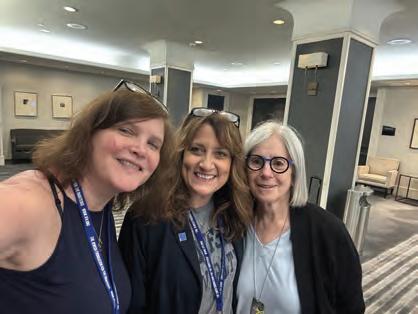

Inclusion expert Aprilynn Artz pulled up to the Jewish Community Center’s South Hills Day Camp. She exited her car and noticed children and counselors surrounding the flagpole, joining in a timeless summer activity.
“Everybody was engaged,” Artz said.
The mental health professional saw several children with headphones. A few kids with sensitivity toward auditory stimuli had worn them for previous activities. For others, Artz said, it was their first time using the gear.
Artz kept observing.
Administrators were on site. Extra professionals were, too, but they were less noticeable. The scene she said, “was wholesome and fun and delightful and supportive. And it just looks like the best time ever.”
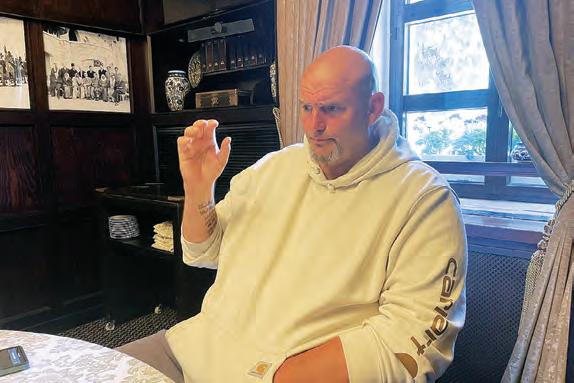
Speck and Artz have worked together for nearly six years. The youth-centered professionals collaborate on improving inclusion at the JCC’s overnight camp, day camp and afterschool programs.
What they’re targeting now is being “truly inclusive,” Speck said, which means if you entered a space “you wouldn’t know who is receiving support and who isn’t.”
Artz is president of Connection: Counseling & Consultation and oversees a team of mental health professionals who serve the community.
For the past year, the practice has partnered with Hillel Academy of Pittsburgh — the Squirrel Hill-based Jewish day school also runs a summer camp.
By Alex Traiman | JNS
Atwo-state solution is something for which Sen. John Fetterman of Pennsylvania hopes in theory, “but certainly not at this — not right now,” he told reporters in an intimate gathering in Jerusalem on June 27.
“I was appalled when our allies, whether it’s Ireland or Spain or others, were calling for recognizing that — that’s outrageous,” he said of some countries recognizing an independent Palestinian state. “Why would you give Hamas that kind of a reward when you have Israeli citizens still held hostage, and you’re in the middle of a war?”


Summer camps nationwide are aiming to increase their inclusivity. Achieving that goal requires more than bolstering diversity. It means creating a “sense of belonging and value,” according to the American Camp Association.
Inclusivity isn’t just “serving neurodiverse kids or kids with diagnoses. This is about changing a culture,” Rachael Speck, the JCC’s division director of Children and Family, Day Camping and Teen Engagement, said.
“April and her team’s work is invaluable,” Hillel Academy Principal Rabbi Sam Weinberg said. “They have the unique ability to understand each child and put supports in place so that each child can succeed in each environment.”
Whether at school or camp, inclusion is about reaching the same goal, Artz explained.
“We focus on the social and emotional needs at each place,” she said. “It’s important; if you can’t get along with other people you’re gonna have a harder road.”


“How is that, what’s wrong with you?” the pro-Israel senator said. “It’s crazy. I can’t explain it.”
Asked what he thought of reports that the White House has been slow-tracking weapons shipments to the Jewish state, Fetterman said that he disagrees with President Joe Biden on the matter.
“I’ve been very clear there’s no conditions, and that hasn’t changed with me,” he said.

By David Rullo | Senior Sta Writer
James Hayes, the Republican candidate for Pennsylvania’s 12th Congressional House seat, met with residents of The New Riverview Apartments — a Jewish Association on Aging community — during a July 8 midday event.
More than 50 senior citizens heard Hayes — who is challenging Democratic incumbent Rep. Summer Lee — lay out his vision for the district.
The congressional hopeful began by describing his background — a native Pennsylvanian and son of a steelworker, who got a partial scholarship to Georgetown University where he earned an undergraduate degree in international economics. From there, Hayes was awarded a master’s in economics and policy from Princeton University, an MBA in finance and accounting from the University of Chicago and a doctorate in business administration from Case Western Reserve University.
Prompting the first of many laughs, Hayes called himself “the candidate that George Santos wanted to be.”
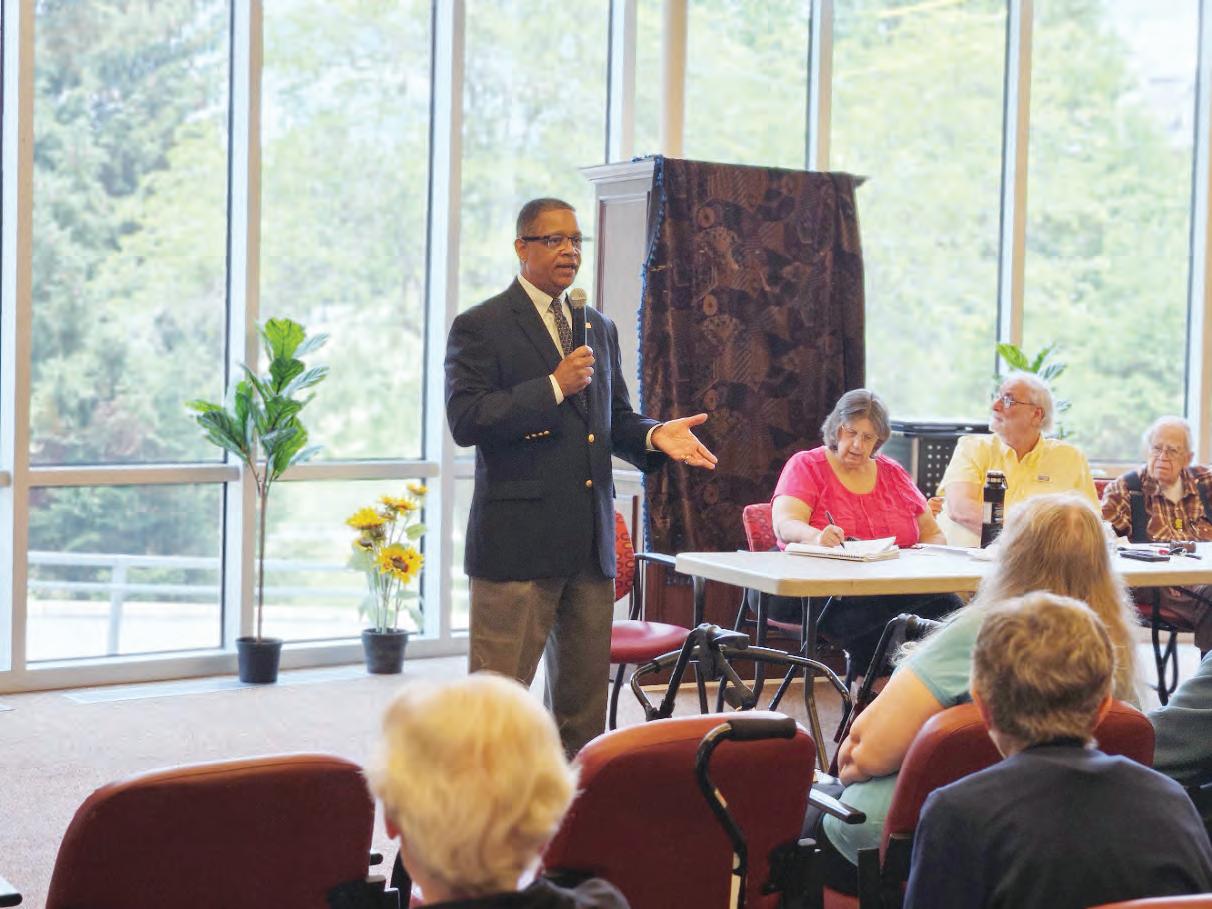
He said that he has five children and is married to a woman he met in Mexico, before pointing out that he worked 30 years in private industry and six years for the Federal Reserve.
“I am not a career politician,” Hayes said, then explained that he is focused on four issues: crime, support for the energy industry, school choice and the southern border.
While Hayes said that he is pleased to see the Shuman Juvenile Detention Center reopen, he believes there needs to be more opportunities for young people.
“They say idle hands are the tool of the devil,” he said. “I absolutely believe that.”
Shifting gears, Hayes said that
a poorly performing school district to one with better educational opportunities.
“If they hadn’t done that, I like to say I would have been the smartest criminal in all of Pennsylvania,” he remarked before noting that a child’s future shouldn’t be determined by the zip code in which they live.
Addressing the issues at the border, Hayes said that he is all for legal immigration, noting again that his wife is Mexican and that he believes the immigration process makes the country better.
“I think we need to control the border,” Hayes said, citing the millions of undocumented immigrants who have entered the country in the last three years. “We need
that’s what the purpose of a public servant is,” he told The New Riverview residents.
Hayes picked up on that thread during the question-and-answer period when he was asked why he wants to run for office and about his fundraising.
His opponent, he replied, is a “TikTok star” that has national attention. Hayes said that his campaign is being funded mostly through small donations from individual donors.
The District 12 incumbent was mentioned again when an attendee said that Lee was a member of “the Squad” and, in his opinion, a “big antisemite.”
In a comment that elicited much

SUBSCRIPTIONS subscriptions@pittsburghjewishchronicle.org 412-687-1000, ext. 2
TO ADVERTISE advertising@pittsburghjewishchronicle.org 412-687-1000, ext. 1
EDITORIAL DEPARTMENT
Email: newsdesk@pittsburghjewishchronicle.org
BOARD OF TRUSTEES
Evan H. Stein, Board Chair
Gayle R. Kraut, Secretary
Evan Indianer, Immediate Past Chair
Gail Childs, Dan Droz, Malke Steinfeld Frank, Seth Glick, Tammy Hepps, Judith Kanal, Cátia Kossovsky, Charles Saul, Derek Smith
GENERAL COUNSEL
Stuart R. Kaplan, Esq.
applause, Hayes said that his wife worked at Community Day School — a Jewish day school in Squirrel Hill — and that the two
“That was one of the big reasons that I wanted to run,” he said, contrasting himself to Lee. “It’s not just antisemitic. She actually,
Hayes was pushed on his positions regarding gun control and school choice, as well as nuclear energy, before being asked about his support for American funding of
The two regions, he answered, should be
Israel, he said, must be funded, noting that Israeli security is a matter of America’s national defense. He added that he believes if Hamas and Hezbollah didn’t attack Israel, they would attack the United States.
Ukraine, Hayes said, doesn’t warrant perpetual funding and might have to consider alternatives to a continual
“I don’t think we can keep funding Ukraine forever and ever,” he said. “I think we need to work on finding a political solution to Ukraine. That political solution may be that, you know, they don’t get Crimea back.”
Asked if he supported former President Donald Trump, Hayes said that he was more concerned with local politics and the people he would represent if elected. He also promised that he would not support a national ban on abortion.
Organizers told those in attendance that the conversation with Hayes was just the first visit from a candidate before November’s election. They hope to have Lee or a representative from her campaign speak at The New Riverview in August, Senate hopeful David McCormick in September and Sen. Bob Casey in October. PJC
David Rullo can be reached at drullo@ pittsburghjewishchronicle.org.
5915 Beacon St., 5th Floor Pittsburgh, PA 15217
Main phone number: 412-687-1000
Subscriptions: 412-687-1000, ext. 2
Jim Busis, CEO and Publisher 412-228-4690 jbusis@pittsburghjewishchronicle.org
EDITORIAL
Toby Tabachnick, Editor 412-228-4577 ttabachnick@pittsburghjewishchronicle.org
Andy Gotlieb, Contributing Editor
Adam Reinherz, Senior Staff Writer 412-687-1000 areinherz@pittsburghjewishchronicle.org
David Rullo, Senior Staff Writer 412-687-1000 drullo@pittsburghjewishchronicle.org
Kathleen Gianni, Staff Writer kgianni@pittsburghjewishchronicle.org
ADVERTISING
Amy Weiss, Account Executive (412) 613-0697 aweiss@pittsburghjewishchronicle.org
PRODUCTION
Jeni Mann Tough Production Manager
Carl Weigel
Art/Production Coordinator Subscriptions subscriptions@pittsburghjewishchronicle.org 412-687-1000, ext. 2
Published every Friday by the Pittsburgh Jewish Publication and Education Foundation 5915 Beacon St., 5th Floor Pittsburgh, PA 15217
Phone: 412-687-1000
POSTMASTER:
Send address change to PITTSBURGH JEWISH CHRONICLE, 5915 BEACON ST., 5TH FLOOR PITTSBURGH, PA 15217
(PERIODICAL RATE POSTAGE PAID AT PITTSBURGH, PA AND AT ADDITIONAL MAILING OFFICES)
USPS 582-740

Manuscripts, letters, documents and photographs sent to the Pittsburgh Jewish Chronicle become the property of this publication, which is not responsible for the return or loss of such items.
The Pittsburgh Jewish Chronicle does not endorse the goods or services advertised or covered in its pages and makes no representation to the kashrut of food products and services in said advertising or articles. The publisher is not liable for damages if, for any reason whatsoever, he fails to publish an advertisement or for any error in an advertisement. Acceptance of advertisers and of ad copy is subject to the publisher’s approval. The Pittsburgh Jewish Chronicle is not responsible if ads violate applicable laws and the advertiser will indemnify, hold harmless and defend the Pittsburgh Jewish Chronicle from all claims made by governmental agencies and consumers for any reason based on ads appearing in the Pittsburgh Jewish Chronicle


By David Rullo | Senior Sta Writer
Adam Hertzman is readying for a new journey nearly a decade after beginning his tenure as the Jewish Federation of Greater Pittsburgh’s vice president of marketing.
He’s leaving his post at the Federation this month to launch a consulting firm.
Hertzman was with the organization through tumultuous times, including moving from its longtime home in the heart of Oakland to Technology Drive along the Monongahela River; the horror of the Pittsburgh synagogue shooting; shifting its mission after commissioning a community study; COVID-19; and Hamas’ Oct. 7 terrorist attack on Israel.
The Chronicle sat down with Hertzman as he reflected on his time with the nonprofit and spoke about his future.
The interview has been edited for length and clarity.
You’ve been with the Federation for almost 10 years. Why leave now to start your own consulting business?
The single biggest reason is that there are different opportunities in the Jewish nonprofit [world] that lend themselves to somebody with my expertise — not the least of which is the Federation system is moving to a new customer relationship management system, and Pittsburgh is on the leading edge of that transition. I feel I can bring some of that knowledge to other Jewish Federations.
You came to Pittsburgh almost 20 years ago when you and your wife relocated for her job at the RAND Corp. Now that your role at Federation is ending, do you plan on staying in the region?
For certain. We love Pittsburgh and really love this Jewish community. Monica


[Hertzman’s wife] and I moved here with our baby in tow, who’s now 21. Neither of us had ever lived in a Jewish community that’s quite so tightknit as this one. I lived in the D.C. area and Boston and L.A. Monica had lived in L.A. and Dallas and overseas — London and Bologna, Italy. Neither of us has ever lived in a Jewish community that has quite the feeling this one does.
How did you get involved with the Federation?
I started volunteering. Federation helped me do some networking and to get my first job in Pittsburgh. I had volunteered with the young adult group, Shalom Pittsburgh, and I had volunteered on some marketing initiatives. So, when the Federation job opened, I happened to be looking for a new job at the time, and it looked interesting. I had met Brian Eglash (Federation’s chief development officer) already through my volunteer work and one thing led to another. It was a good fit.
I don’t know that I had planned to stay this long at Federation. Certainly the Oct. 27 attack changed my thinking. I saw that there was a lot of work to be done, I saw how much the Jewish community needed Federation’s leadership. I wouldn’t have made the switch from a for-profit to a nonprofit if I didn’t believe in the mission to begin with. I tell people it took a couple of years of therapy before I came around to reconcile two feelings. One was how terrible I felt. Both for myself and for the families who lost loved ones to a terrorist attack. But the other feeling was that I felt immense professional fulfillment in the work I did after the attack. It took therapy to make me realize that those two feelings were compatible, that I could feel both pride and a sense of accomplishment, that didn’t diminish feeling terrible for the families. That’s a hard set of thoughts to put together. I’m immensely proud of the
A spotty and inconsistent network is disruptive. With FSA Consulting’s Business Internet services, you can rely on fast, reliable connectivity, keeping your staff and clients happy. End the frustration and get the help your network needs.

Submit calendar items on the Chronicle’s website, pittsburghjewishchronicle.org. Submissions also will be included in print. Events will run in the print edition beginning one month prior to the date as space allows. The deadline for submissions is Friday, noon.
q SATURDAY, JULY 13
Brian Schreiber, chief external affairs officer and special advisor to the CEO of the JCC of Greater Pittsburgh, will speak about his recent trip to Israel during Tree of Life Congregation’s Shabbat in Sixty service. 9:45 a.m. Levy Hall, Rodef Shalom. treeoflifepgh.org.
q SUNDAYS, JULY 14–DEC. 29
Join a lay-led online parshah study group to discuss the week’s Torah portion. No Hebrew knowledge needed. The goal is to build community while deepening understanding of the text. 8:30 p.m. For more information, visit bethshalompgh.org.
q MONDAYS, JULY 15–DEC. 30
Join Congregation Beth Shalom for a weekly Talmud study. 9:15 a.m. For more information, visit bethshalompgh.org.
Join Temple Sinai for an evening of mahjong every Monday (except holidays). Whether you’re just starting out or have years of experience, you’re sure to enjoy the camaraderie and good times as you make new friends or cherish moments with longtime pals. All are welcome. Winners will be awarded Giant Eagle gift cards. All players should have their own 2024 mahjong cards. Contact Susan Cohen at susan_k_cohen@yahoo.com if you have questions. $5. templesinaipgh.org.
q WEDNESDAYS, JULY 17–SEPT. 4
Join Rodef Shalom Congregation for Biblical Garden Open Door Tours: docent-led tours of the congregation’s
Biblical Botanical Garden the first Wednesday of the month. Free. Noon. 4905 Fifth Ave. rodefshalom. org/garden.
q WEDNESDAYS, JULY 17–DEC. 18
Temple Sinai’s Rabbi Daniel Fellman presents a weekly Parshat/Torah portion class on site and online. Call 412-421-9715 for more information and the Zoom link.
Bring the parashah alive and make it personally relevant and meaningful with Rabbi Mark Goodman in this weekly Parashah Discussion: Life & Text 12:15 p.m. For more information, visit bethshalompgh. org/life-text.
q WEDNESDAYS, JULY 17; AUG. 21; SEPT. 18; OCT. 16; NOV. 20; DEC. 18
Join AgeWell for the Intergenerational Family Dynamics Discussion Group at JCC South Hills the third Wednesday of each month. Led by intergenerational specialist/presenter and educator Audree Schall. The group is geared toward anyone who has children, grandchildren, a spouse, siblings or parents. Whether you have family harmony or strife, these discussions are going to be thought-provoking, with tools to help build strong relationships and family unity. Free. 12:30 p.m.
q THURSDAY, JULY 18
Join the Holocaust Center of Pittsburgh for its Generations Speaker presentation with Melissa Marks, who will share stories about her mother, grandmother and grandfather. Free. 6 p.m. Chatham University’s Mellon Board Room, Chapel Hill Road, 15232. hcofpgh.org/event/generations-speakerpresentation-by-dr-melissa-marks/.
Join Rodef Shalom’s Cantor Toby Glaser and Student Rabbi Jules Ilian at a 20s-40s meetup at Picklesburgh. Relish meeting new friends,

exploring, and finding out if you’re kind of a big dill by completing our Picklesburgh scavenger hunt. 6 p.m. meetup spot will be texted prior to the event. rodefshalom.org/picklesburgh.
Join Chabad of Squirrel Hill for a Women’s Farbrengen, an evening of Chassidic songs and stories on the topic of “Igniting Jewish Passion.” Enjoy hot drinks and desserts. 7 p.m. 1700 Beechwood Blvd. $10 suggested donation. chabadpgh.com/farbrengen.
q FRIDAYS, JULY 19; AUG. 23
Join Tree of Life Congregation as they celebrate the welcoming of Shabbat. Meet before Shabbat begins to greet one another in the beautiful Rodef Shalom Botanical Gardens for Shabbat on the Rocks. Free. 6 p.m. 4905 Fifth Ave.
q TUESDAY, JULY 23
Young children and their grownups are invited to join Rodef Shalom Librarian Sam Siskind for a story in their Biblical Botanical Garden followed by a crafty activity. 1 p.m. rodefshalom.org.
q WEDNESDAY, JULY 24
Join Chabad of the South Hills for their Senior Carnival. Enjoy a picnic-style lunch, interactive games and summer fun. Suggested donation $5. Noon. RSVP by July 19 to 412-278-2658. chabadsh.com.
Rendezvous in Rodef Shalom’s Biblical Botanical Garden for a live performance with Craig Davis Jazz. Join them for drinks and hors d’ouvres as they bring the swinging sounds of the Jazz Age back to life. Free. 6:30 p.m. rodefshalom.org.
q WEDNESDAYS, JULY 24; AUG. 7, 28
Join JFCS and 10.27 Healing Partnership for an art-based mindfulness program. The group will explore ways making art can help regulate the nervous system, promote playfulness and imagination, and connect us more deeply to our bodies, emotions, thoughts and worldviews. Attendees will come together in community as we explore different art mediums, share our personal experiences and reflect on how art can influence us all. Free. 10 a.m. 10.27 Healing Partnership Suite, 3rd floor of the JCC in Squirrel Hill. Membership not required. Registration required. 1027healingpartnership.org/art-in-community-3.
q WEDNESDAYS, JULY 24; AUG. 7, 28; SEPT. 4, 18
Chabad of Monroeville invites you to spend an hour playing mahjong and other games. Play, shmooze, learn a word of the Torah, say a prayer for Israel and, of course, nosh on some yummy treats. Free. 7 p.m. RSVP is required: SusanEBurgess@gmail. com, or text or call 412-295-1838. 2715 Mosside Blvd. jewishmonroeville.com/mahjong.
q SATURDAY, JULY 27
Join Rabbi Hazzan Jeffrey Myers as he dialogues with Pastor Vincent Campbell. Pastor Campbell
is senior pastor of Ebenezer Baptist Church and a longtime friend of Tree of Life Congregation. 9:45 a.m. Levy Hall, Rodef Shalom Congregation. treeoflifepgh.org
q TUESDAY, JULY 30
Enjoy a summer evening schmoozing with fellow young Jewish professionals, ages 20 to 40, over wine and cheese in Rodef Shalom’s Biblical Botanical Garden. 7 p.m. Free, but registration is required. rodefshalom.org.
q TUESDAYS, JULY 30; AUG. 13
Join Tree of Life congregants at the Schenley Park Oval as they meet to enjoy the outdoors, pet dogs and converse with one another. Free. Every other Tuesday, June through August. 6:30 p.m. treeoflifepgh.org.
q SATURDAY, AUG. 3
Families with young children are invited to spend Shabbat morning with Rodef Shalom at Shabbat with You. Drop in for a light breakfast, play date, sing-along with Cantor Toby and a Shabbat activity with Family Center Director Ellie Feibus. 9 a.m. $5 per family. 4905 Fifth Ave. rodefshalom.org/ shabbatwithyou.
q MONDAYS, AUG. 5, SEPT. 9
Join the 10.27 Healing Partnership for one or all sessions of this healing, consciousness-building forest bathing series. Enjoy gentle walks through Pittsburgh’s parks while nurturing your connection to the natural world through reflective practices. 9:30 a.m. Free. Registration required. Walled Garden in Mellon Park. 1027healingpartnership.org/ forest-bathing-4.
q THURSDAY, AUG. 8
Women are invited to join Chabad of Squirrel Hill and bake butterfly challahs at Loaves of Love 7 p.m. $12. 1700 Beechwood Blvd. chabadpgh.com/lol.
q SUNDAY, AUG. 18
Join the Tree of Life Congregation for its annual summer picnic. Food, games and activities. 2 p.m. $10 member/$12 non-member. JCC Family Park, 261 Rosecrest Drive, Monroeville, 15146. Reservation deadline is Aug. 11. treeoflifepgh.org/ congregationalpicnic.
q WEDNESDAY, AUG. 21
Rendezvous in Rodef Shalom’s Biblical Botanical Garden with drinks and hors d’ouvres for a free live performance with Doug Levine and Cantor Toby Glaser. 6:30 p.m. 4905 Fifth Ave. rodefshalom.org.
q THURSDAY, SEPT. 12
Join StandWithUs for its inaugural Pittsburgh Community Reception honoring Pittsburgh City Controller Rachael Heisler and featuring keynote speaker Lt. Col. (Ret.) Jonathan Conricus. 6 p.m. Early bird: $90; VIP: $250. Rodef Shalom Congregation, 4905 Fifth Ave. standwithus.com/pittsburghevent-2024. PJC

Just 10 days after the groundbreaking for the new Tree of Life building, the congregation received an electronic bomb threat.
“It came in late in the morning,” said Shawn Brokos, the Jewish Federation of Greater Pittsburgh’s community security director. “We were able to determine immediately that it was a hoax.”
The Tree of Life building was the site of the Oct. 27, 2018, antisemitic attack that left 11 worshippers from three congregations
dead and several other people wounded. The July 2 threat was similar in language to previous threats that have been aimed at Jewish institutions both locally and throughout the country.
Brokos said that the threat was forwarded to both the Pittsburgh police and the FBI, who are investigating.
Anyone who receives a threat or witnesses antisemitic activity should contact police and report it to Federation at jewishpgh.org/ form/incident-report. PJC
— David Rullo
By Kathleen Gianni | Special to the Chronicle
Two Pittsburgh-area teachers were among 22 middle and high school Holocaust educators from across the United States and Poland selected for an in-depth academic program sponsored by The Jewish Foundation for the Righteous.
Rebecca Baverso from St. Bede’s School and Michele Russo from Seneca Valley Intermediate School were chosen for the 2024 Alfred Lerner Fellowship.
As a part of the fellowship, the educators attended an intensive five-day Summer Institute for Teachers course in Elizabeth, New Jersey, from June 22-26. The program helped fellows consider new ways to think about and teach the Holocaust.
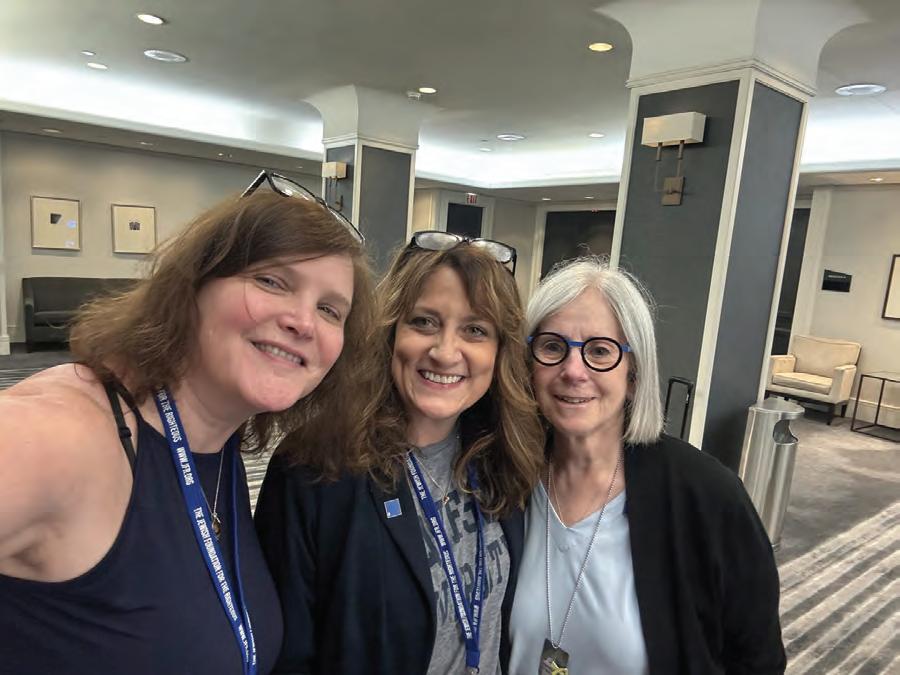
Baverso and Russo had the opportunity to become Lerner Fellows after being nominated for the program by the Holocaust Center of Pittsburgh. After submitting their applications and being selected for the program by the Jewish Foundation for the Righteous, the Holocaust Center supported the local fellows’ trip to the Summer Institute through funding from an anonymous donor and the Jack Sittsamer Holocaust Endowment Fund for Teacher Training, according to Emily Loeb, the director of programs and education at the Holocaust Center.
At the Summer Institute for Teachers, the fellows heard from three or four expert Holocaust speakers daily, including authors, professors and other scholars. The course explored antisemitism’s history, the Holocaust and contemporary manifestations of antisemitism.
Among this year’s speakers were Volker Berghahn of Columbia University, Holocaust historian and exhibition curator Paul Salmons, author Alexandra Zapruder and American
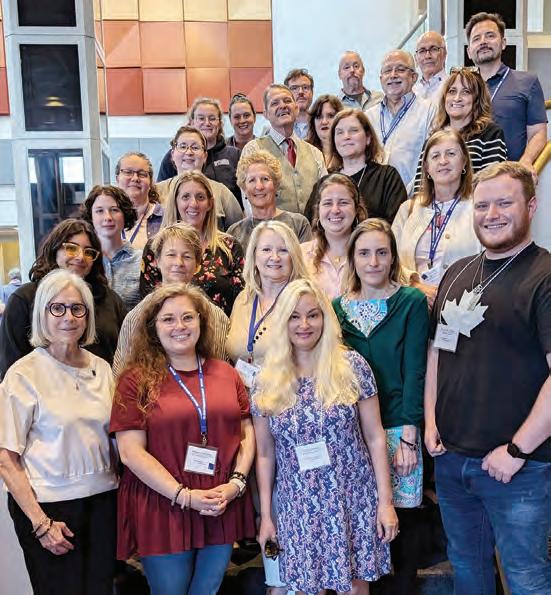
Jewish Committee U.S. Director for Combating Antisemitism Holly Huffnagle.
Baverso and Russo said they were particularly impacted by Doris Bergen, a Holocaust historian and University of Toronto professor. Bergen’s presentations focused on anti-Judaism and antisemitism and instruction on how to teach the topics in engaging and meaningful ways.
“All of the Lerner Fellows have some level of expertise on the Holocaust, but each of
the speakers was able to take that knowledge and present it in new and challenging ways,” Baverso said. “I think it would be safe to say that everyone benefited from and appreciated looking at the subject in a new way.”
“Thinking through the history, topics and how to make connections with these scholars on many occasions made many of us say, ‘Wow, I never thought of it that way,’” Russo added.
By Adam Reinherz | Senior Staff Writer
Pittsburgh-area educators and students expanded their classrooms by 700 miles.
The learning cohort traveled to Atlanta, Montgomery, Selma, Birmingham, Memphis, Louisville and Cincinnati from June 16-24 to better understand the Civil Rights Movement.
Organized by Classrooms Without Borders, the eight-day seminar was “extraordinary,” Tess Riesmeyer, 56, said. “It was heartbreaking. It was joyful. It was everything.”
Riesmeyer is the co-head teacher of language arts and humanities at Sewickley Montessori Middle School.
Interacting with individuals intimately involved in the Civil Rights Movement was particularly impactful, she said, as conversations with Freedom Riders (activists who rode interstate buses into the segregated South) and Foot Soldiers (peaceful marchers) shared firsthand knowledge.
“I was [able] to hear history through the mouths of the people who made it,’” Riesmeyer said.
“Getting an opportunity to be in the places where things happened, and to actually talk to some of the Foot Soldiers that participated in the Civil Rights Movement, was e ye-opening as to the level of humanity involved,” Northgate School District educator Regis McDevitt, 39, said. “You can only teach

so much from the textbook.”
Listening to history makers and visiting memorials not only yielded insight about the “inner workings of the Civil Rights Movement,” but also underscored aspects not taught in school, Pittsburgh CAPA student Laila King, 16, said.
“I feel like in school they kind of talk about the Civil Rights Movement in a very general way,” she continued. “Going on this trip taught me more about how movements don’t just happen overnight — it’s multiple different small or big actions that contribute to an overall movement and overall change.”
About 20 Pittsburghers visited historic
commons.wikimedia.org/w/index.php?curid=68112008
sites and museums. Along with touring the Ebenezer Baptist Church and Hebrew Benevolent Congregation in Atlanta, and the National Voting Rights Museum and Institute in Selma, travelers marched across the Edmund Pettus Bridge.
Journeying through the South “felt like I was reading a book,” King said. “It’s like my eye was opened to all this new information.”
Several stops highlighted the horror experienced by those seeking greater freedoms.
“It was a very emotional experience to see all of these vile images of brutality, and what people had to go through in order to secure the very rights that I have today,” King said.
“The entire thing was amazing, but it was traumatic, and there were a lot of emotions, which is why it was so long,” Pittsburgh CAPA student A’Lani Hutson-Jarrett, 16, said of the seminar. “There was so much information and we needed time to really think about the things that we were seeing.”
Throughout the trip, time was dedicated to process, journal and discuss each day’s discoveries, which Hutson-Jarrett found helpful.
“I am not a social butterfly,” she said. “I am not someone who likes to talk a lot. I’m not someone who goes out of my way to meet new people. So with this experience that just came with it.”
For the high schooler, the seminar didn’t only prompt connections with fellow travelers but new ties to family.
Inside The Legacy Museum: From Enslavement to Mass Incarceration are jars of soil from various lynching sites across the United States.
“They had them all on display and there were stories about them,” Hutson-Jarrett said. “We didn’t expect to see things like that.”
After viewing the exhibit, the teen immediately exited the space and called her grandmother.
“I got my family history. I found out where we were from. I also found out a possible relative was most likely lynched,” she said.
Finding a personal connection to the past, Hutson-Jarrett said, gave her new insight.
Please see Holocaust, page 11 Please see Civil Rights, page 11



By Lydia Kacala | Contributing Writer
Creating an estate plan involves creating a will, but may also involve drafting and signing other important documents that ensure the person’s estate is handled in the way they want after their death. Throughout the estate planning process, trusts may also be created to help people when leaving their assets behind.
Many different kinds of trusts exist for people to create throughout their estate planning process, which often go into effect following a person’s death. However, living trusts allow for people to create a trust that can go into affect prior to someone’s death.
When creating a trust, there are specific people who must be named in the legal document — the grantor, the person who owns the assets included in the trust and is the creator of the trust; the trustee, the person who holds the titles to the assets and manages day-to-day administration of the trust; and the beneficiaries, the person, or people, inheriting the assets following the death of the grantor, according to Stephen Gariepy, national co-chair of the estate planning, wealth transfer and preservation

section at Hahn Loeser & Parks LLP, and Margaret Metzinger, partner in the estate planning, probate and trust administration department at Frantz Ward LLP, both in Cleveland.
“In either trust, you have to have a beneficiary,” Metzinger said. “That could be an individual, it could be another trust, (or) it could be a charitable organization. There is really no requirement on who can receive the benefit of the decedents testamentary trust or revocable trust.”
While these types of trusts have similar people named in the documents, a living
trust and a testamentary trust are entirely different documents, with a testamentary trust being created in a person’s will and a living trust being its own document, Metzinger explained.
Testamentary trusts are created and kept in a person’s will, with the assets being distributed after someone dies through probate court, she added. Probate court has the authority to oversee the administration of the trust until it’s terminated, she said.
However, a living will is not subject to court supervision, Metzinger said. People
SPONSORED CONTENT
often transfer assets to a living trust, or a revocable trust, prior to their death to protect their family from going through probate court.
Another difference between the two trusts is the ability to keep records of what a person owns private and confidential, Gariepy said.
Since testamentary trusts are required to be supervised by probate court, they are also public record, meaning anyone can find the information included in the trust — beneficiaries, assets and more, he explained. A living trust allows people to keep their assets, and other information included in the trust, out of public records, Gariepy added.
In order to avoid probate court when making a living trust, the assets must be transferred to the trust during the person’s lifetime, which is something that is often overlooked, he said.
“Simply having a living trust on paper does not avoid probate; you actually have to transfer assets into your living trust during your lifetime in order to avoid probate,” he said. “I always tell people it’s important, periodically, to review their estate plan and make sure that their asset ownership is properly in their living trust. I find that something that’s commonly overlooked.” PJC
Lydia Kacala writes for the Cleveland Jewish News, where this first appeared.
This is one in a series of articles about Elder Law by Michael H. Marks., Esq.
Michael H. Marks is an elder law attorney with offices in Squirrel Hill. Send questions to michael@marks-law.com or visit www.marks-law.com.
Did you know that you already have an estate plan in place, even if you don’t yet have a Will or Powers of Attorney? Your present estate plan, designed in part by your choices and in part by the Commonwealth of Pennsylvania, includes how things you own and the beneficiaries you’ve designated on insurance or IRAs can be accessed now, and distributed after your death. So what “more” do you need, and why do you need it?
You need it because what’s at stake is everything you’ve ever worked and saved for, and the future of those you love. But while your present estate plan elements, under your existing deposit agreements (at the bank, IRA and insurance contracts etc.) and as mandated by the State, they may address what happens after you die, they do not address issues of disability or incapacity while you are alive. All of your wealth can be at risk without the right planning. The “what more“ starts with Wills, Powers of Attorney and often Trust provisions or agreements.
Most people agree that life goes better with planning. Every one of us plans constantly, daily and in the short term, and for the more distant future. We plan and act in advance to prevent problems and in case something goes wrong. Homeowners insurance and having a spare tire in your car illustrate the idea - even though we rarely need them.
Estate planning means making legal plans and arrangements with tools like Wills and Powers
of Attorney, Trusts and deeds, to maintain your best life when things are going well, and setting down directions and guidance in case anything bad happens to you, like death or disability. It’s all about making your own choices, writing it down and signing it to make it stick later.
You get to choose HOW your wealth is safeguarded and enjoyed; WHO you want to help you if you need assistance; and WHAT you want them to do to help you. The goals of estate planning also include preserving your wealth generally, making sure the right people inherit from you in the right way, and saving taxes and administrative costs during periods of transition.
What happens if bad events occur before we’ve done the right kind of legal estate planning?
What’s the risk? If you are disabled without powers of attorney in place, whoever is going to help – often even your own spouse! – has to go to court and bring proceedings before a judge to be officially appointed as your Legal Guardian. Even worse, the Court may appoint someone to be in charge of you whom you know you don’t want, or even a stranger.
If you die without making good arrangements in advance, your estate might be inherited by the wrong people, or someone might be in charge of winding up your affairs who you really don’t want. Your heirs and family might argue and fight, in ways that can easily be prevented.
Trusts are mysterious to many, but they are not just for the rich. The idea of trusts describes a very broad range of uses and applications. Every trust though is a triangle or three-way transaction. The three players are the trust creator; the trustee; and the trust beneficiary.
The simplest example is when parents include “testamentary trust” provisions in their Last Will and Testament so some other responsible adult - someone they have confidence in, someone they trust - can help their young children if the parents die too soon. Other common examples include a revocable trust that we create during our lifetime, a so-called “Living Trust” that helps avoid probate and accomplish other estate planning goals when we are gone. Trusts are also used to give to charities while retaining financial and tax benefits for the donor. A Irrevocable Trust is generally intended to separate the person from ownership or control of the money in some way, such as for tax or benefits eligibility purposes.
To make estate planning arrangements like a Will or Power of Attorney you need to have mental capacity to know what you’re doing, to make a sound and independent decision.

Estate planning is not just for older people. Younger people become incapacitated or die young sometimes too. Younger people also often have young children to plan for.
The law of estate planning is generally more static and stable and doesn’t change very fast, but it does change sometimes. More frequently, your circumstances concerning your family or your finances may change.
There’s also a lot more in common that there is dramatically different in the estate and trust laws of one state compared to others. Nonetheless, if you move to a different state, it can be a good idea to have your old estate planning reviewed in your new state.
At Marks Elder Law, we help people every day with issues like these. I invite your questions and feedback. Please let me know how I can help you and your family.


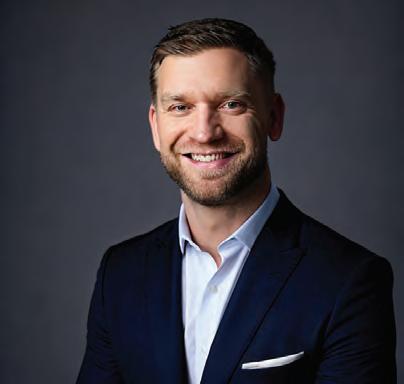
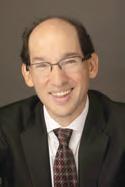

Most people assume that all of their assets pass under their last will and testament. That is an estate planning myth.
A joint account or beneficiary designation overrides the terms prescribed under your will (or revocable trust). Therefore, it is critical to coordinate your beneficiary designations and account ownership with the terms of your will (or revocable trust) if you wish for them to be consistent.




Suppose that you name your spouse and then your minor children as beneficiaries of your IRA. If your spouse predeceases you, the IRA will get paid outright to a child who is 18 or older and to a guardian of the child’s estate if the child is under 18, with restrictive investment rules and onerous reporting requirements to the court even if the terms of your will/trust include a trust for any child under 35.
Similarly, if you name a child as a joint owner on a bank account, then upon your passing that child will automatically receive the balance of the account. It will only be shared among all of your children (likely your intent) if the surviving child makes a gift. If you want joint accounts or beneficiary designation accounts to be distributed in the same manner as your will/trust, you will need either to update the account ownership or the beneficiary designation.
If you have a retirement account, chances are that you completed a beneficiary form designating who should receive the account upon your death. Most of these forms are straightforward with simple options that work for many people.
That said, sometimes your estate plan may have some qualifications that a standard form cannot accommodate. You can plan for these scenarios by completing a custom beneficiary attachment.
Most standard beneficiary forms allow for one or more primary beneficiaries and one or more contingent beneficiaries. The form will usually allow you to elect that a deceased beneficiary’s share is either distributed among the surviving named beneficiaries or directed to the deceased beneficiary’s descendants (“per stirpes”).
Let’s consider a common scenario where your spouse is named as the primary beneficiary and then your adult children (with a “per stirpes” election) are named as contingent beneficiaries. If your spouse predeceases you, inherited IRAs will be created for your children and each child can decide what to do with the inherited IRA.
Now consider what would happen if a child predeceases you. The per stirpes election would direct that child’s share to their children. This is likely the same result as your will/trust, at least insomuch as it directs the property to your grandchildren.
However, what if your will/trust includes a trust until age 35 to protect their inheritance? Since the beneficiary designation bypasses the terms of your will/trust, your grandchild will receive the property outright at 18, overriding the very intentional terms of your will/trust.
What if an inheritance should be directed to a special needs trust? What if there are unique contingencies for deceased beneficiaries? What if you want to name different beneficiaries if a beneficiary disclaims (chooses not to accept) an inheritance compared to the beneficiaries if a beneficiary predeceases you. What if you want to use a specific dollar amount for a beneficiary and then direct the balance on a percentage basis to other beneficiaries?
Navigating this complex intersection
So what do you do when a standard beneficiary form is not enough? Well, it depends.
We will consider naming a revocable trust as a beneficiary to address additional contingencies.
Charitably minded individuals might create an IRA specifically for charitable purposes and manage its size for inheritance purposes through qualified charitable distributions and strategic required minimum distribution planning.
Some individuals will choose to convert an IRA into a Roth to assist higher-income tax beneficiaries. A custom beneficiary attachment combined with the above techniques can enable you to achieve your planning goals.
It is a good idea to review (and potentially update) your estate plan, especially after major life events such as marriage, divorce, birth of a child, a change in financial adviser or the death of a beneficiary or executor. PJC
Matt Schwartz (Mt. Lebanon) and John Montoya (Greenfield) own Schwartz Montoya Legal in Squirrel Hill. They provide innovative comprehensive retirement and estate planning advice and support families through compassionate and thoughtful estate and trust administration.
ADL joins with legal powerhouse to seek compensation for U.S. victims of Oct. 7 massacres
The Anti-Defamation League’s legal team is joining with a top-ranked American legal firm to seek compensation for U.S. victims of the Oct. 7 Hamas massacres in Israel, JTA.org reported.
Theirs will be the latest of multiple lawsuits in the United States targeting entities that lawyers say abetted or profited from the atrocities.
The lawsuit filed on July 1 by the ADL and the Crowell and Moring law firm accuses Iran, Syria and North Korea of abetting the terrorists, who murdered some 1,200 people on Oct. 7 and wounded thousands more in addition to abducting more than 250 people.
The plaintiffs seek compensation under a 2015 law that is meant to compensate victims of state-sponsored terrorism through criminal penalties and seized assets.
“Iran is the world’s leading state sponsor of antisemitism and terror — along with Syria and North Korea, they must be held responsible for their roles in the largest antisemitic attack since the Holocaust,” Jonathan Greenblatt, the ADL CEO, said in a press release.
The lawsuit was filed in the U.S. District Court for the District of Columbia. The 2015 law requires fines levied on state
sponsors of terrorism to be streamed into a fund for their victims. The federal government has in recent years directed just a fraction of the money obtained from such fines into the fund.
A Kentucky judge tossed out a lawsuit filed by three Jewish mothers who challenged the state’s abortion law on religious freedom grounds.
On June 28, Jefferson County Circuit Judge Brian C. Edwards ruled that because none of the three women were pregnant — meaning that their case was based on “fears of hypothetical future harm” — the suit could not advance.
Plaintiffs Lisa Sobel, Jessica Kalb and Sarah Baron argued in their lawsuit, filed in 2022, that Kentucky’s abortion law created obstacles to in-vitro fertilization, placing undue burdens on the process of conceiving a child and violating Jewish understandings of when life begins.
Sobel, Kalb and Baron are among a slate of Jewish plaintiffs across America fighting in court for reproductive rights on religious freedom grounds in the years following the Supreme Court’s 2022 reversal of Roe v. Wade, which granted federal protections for abortion. The Kentucky decision came two weeks after a Missouri judge rejected a suit
July 15, 1965 — Rabin warns neighbors not to divert Jordan
filed by interfaith clergy, including rabbis, challenging that state’s abortion restrictions.
“In the case before this Court, the alleged injuries of the three Plaintiffs are hypothetical as none are currently pregnant or undergoing IVF at the present time. Accordingly, the Court simply cannot find that the Plaintiffs have shown ‘the existence of an actual controversy respecting justiciable questions,’” Edwards wrote.
About six weeks after its internal discord over Israel spilled into public view, Judaism’s Reconstructionist movement has issued a statement reiterating its support for progressive Zionism, the existence of Israel and the two-state solution, JTA.org reported.
The movement says the statement is a clarification of its position on Israel following the outbreak of the Israel-Hamas war on Oct. 7, rather than a change.
But the statement comes as Reconstructionist rabbis have taken leading roles in anti-Zionist activism. And it follows an op-ed in which two rabbinical students announced their withdrawal from the Reconstructionist Rabbinical College, writing that they faced harassment as supporters of Israel.
Days after that op-ed was published in the Forward, Rabbi Deborah Waxman, the college’s president, referenced the drama at its ordination ceremony and said the movement believes “Israel has a right to exist and is a vital center for Jewish life and the Jewish people.”
Far-right German politician fined again for using a banned Nazi phrase
A German court has fined a prominent far-right leader for once again using a phrase associated with the Nazis, as Germany’s growing far-right flank shows an increasing comfort with invoking Nazi-aligned phrases and ideas, JTA.org reported.
Björn Höcke, a leader of the Alternative for Germany party, or AfD, was ordered to pay roughly $18,000 for chanting the first two words of the slogan “Everything For Germany,” or “Alles für Deutschland,” in front of a pub crowd in December, and goading the crowd to finish it.
It was the second time in a few months that Höcke, the party leader of the state of Thuringia in what was once East Germany, was fined for using the phrase. In May, judges fined him around $13,000 for use of the phrase in 2021. Nazi stormtroopers engraved the phrase “Everything for Germany” on their daggers. PJC
Items are provided by the Center for Israel Education (israeled.org), where you
July 12, 2006 — Second Lebanon War begins Hezbollah starts the Second Lebanon War by launching rockets and mortars and ambushing an Israeli patrol across the border, killing three soldiers and abducting two others. The fighting lasts until Aug. 14.
July 13, 1941 — Songwriter
Ehud Manor is born
Israel Prize-winning singer-songwriter Ehud Manor is born in Binyamina. Manor composes about 1,200 songs, including 1978 Eurovision winner “A-Ba-Ni-Bi,” and translates 600 others into Hebrew.

July 14, 1555 — Paul IV orders Jews into ghettos
Pope Paul IV issues an anti-Jewish decree, Cum Nimis Absurdum. The Jews of Rome are forced into a ghetto along the Tiber River. Jews also must wear yellow head coverings and are barred from owning property.
Israel Defense Forces Chief of Staff Yitzhak Rabin warns Lebanon and Syria they will face consequences if they move forward with an Arab League-backed effort to divert the sources of the Jordan River.
July 16, 1948 — Violinist Pinchas Zukerman is born
Grammy-winning classical musician and conductor Pinchas Zukerman is born in Tel Aviv. He begins playing the violin by age 8, and by 14 he is studying in New York under the sponsorship of violinist Isaac Stern.
July 17, 1906 — Kibbutz pioneer
Yitzchak Ben-Aharon is born
Yitzchak Ben-Aharon, a pioneer of the kibbutz movement, is born in Romania. He makes it to Palestine in 1928 by walking and riding a donkey. He helps found Kibbutz Givat Haim between Haifa and Tel Aviv.
July 18, 1290 — England expels its Jews
King Edward I orders the expulsion of England’s 4,000 Jews, who had settled there in significant numbers only in the 11th century. Most move to France or Germany. Jews are not allowed back until 1656. PJC



Camp:
Continued from page 1
Camp and history are ‘real’
More than a decade ago Artz worked at JFCS and ran Quest Camp. The therapeutic program served children with ADHD, anxiety or an autism spectrum disorder diagnoses who strug gled with behavior and social relationships.
Artz said she loved the experience and the “amazing bubble” created. The camp was where individuals were “all accepted, where they wanted to come, and they felt comfortable.”
There’s a lot of value in deliberately designed environments, but the wrinkle is they don’t often resemble “real life,” Artz said.
For the mental health professional, the ques tion became, “How do I set these people up for success in the most real situation possible?”

Improving inclusion required entering already existent spaces, with lengthy histories, and creating change, she explained.
Since 1969, J&R Day Camp has welcomed thousands of children to its 100-acre Monroeville site. Guided by Jewish values, the primarily outdoor institution is perpetually innovating while meeting the community’s needs, said Fara Marcus, the JCC’s chief development and marketing officer.
Artz and Speck said they wanted to increase inclusivity at the camp but recognized the inherent challenges.
“When you go into a pre-established system, you have to be careful because there are people who have been part of a system for a long time, and there is tradition, and you have to be careful that what you are trying to implement does not step on people’s toes,” Artz said.
Many of the employees, counselors and unit heads grew up at camp, Speck said.
Continued from page 1
“Before Oct. 7, I was clear I always fully support Israel without any conditions, and after Oct. 7, it’s even more of a period to deliver whatever Israel needs.”
“I didn’t support withholding any of those large bombs because they have to fight an enemy that hides in tunnels,” he said of Israel Defense Forces efforts against the Hamas terror group. “I trust Israel’s judgment. They are not looking to maximize all civilian deaths or anything like that.”
Fetterman said that he is always much more eager “to trust Israel than pretend that there’s anything that you could trust with Hamas or even some of the other nations in our region.”
JNS asked the Pennsylvania senator if he thinks it is appropriate, especially during a war, for Democratic leaders to tell a U.S. ally, which has had five elections in the past five-plus years, when it should choose its leaders and to criticize Israeli Prime Minister Benjamin Netanyahu.
“That’s your leader,” Fetterman said of Netanyahu. “I follow Israel through that, and if that nation elects so-and-so, I’m going to support that person — whether I happen to privately agree or disagree on so many of the kinds of issues.”
If Israel elects a new leader in its next election, “I’m going to support that individual,” the senator added. “That devotion is going to be with Israel through that, and that’s
“They’re the ones that came with all their friends every summer.”
Evolution requires willing parties, so Speck and Artz began with staff training.
“It’s kind of like the influencer model,” Speck said. “When the staff drinks the Kool-Aid and buys in, that spreads like wildfire in the most incredible way.”
Several staffers were invited to become members of the camp’s inclusion team.
“The elevated leadership role is a privilege,” Speck said. “That aspirational arc gives staff something to work toward.”
Another change at the camp involved programming.
Adaptations occurred by “just sprinkling in positive behavior support strategies,” Speck said.
Some of the inclusion-based decisions began up to three years ago. Each choice requires patience, Artz said.
“I have had to learn that doesn’t mean that
going to endure.”
Fetterman declined to criticize Netanyahu.
“The harshest words and the other kinds of judgment should be directed at Hamas, not our ally throughout this,” he said. “I don’t think it’s helpful.”
“If you really do feel like you have to express that, well [it] should be in private,” Fetterman added.
Fetterman was asked if he thinks Netanyahu is doing a good job.
The senator said that he doesn’t think that there are any “actual experts” in the Middle East.
“Otherwise, where’s the document? Where’s the think piece that will solve all of this?” he said. “It’s an incredible situation after an unprecedented kind of situation after Oct. 7. It was kind of a black swan kind of situation.”
The senator said that he believes that it is necessary to confront “that kind of evil like Hamas” and prevent it from enduring.
“There is a duty to help rebuild Gaza and to create a better quality of life for Palestinians,” he continued. “But it is naive to think that that is ever possible if Hamas is to keep their boot on their neck.”
Fetterman also was asked about the threat from Hezbollah. No one wants an escalation, but can Israel be expected to live with such a threat on its northern border, and are there non-military solutions?
“Iran is one of the world’s premier underwriters of terrorism on that, and there won’t be any true, true peace until Iran decides that
everyone is going to go along in the same way,” she said. “There will be people who will be confused because it’s not what they’ve always done. And that doesn’t mean that they don’t want to be inclusive. It means that it’s new, and new things are sometimes scary or unknown.”
Changing the way people think, or act, is never easy, especially at summer camp. Tradition doesn’t only dictate practice but also builds new memories, so decisions primarily have occurred on a “macro level,” Speck said. “Creating a fully inclusive environment would never, can never, happen if you just have consultants come in at a micro level and push in.”
“There is constant debrief and reflection, a lot of planning, and implementing and revising in real-time during camp and during the non-camp season,” Speck added.
Inclusion, now and next Summer is almost halfway over. Work
their organizing principle can’t be that Israel has to be destroyed,” Fetterman said. “That is a risk and that’s a danger that everyone in Israel has always lived under.”
The Iranian regime makes those it funds illicitly agree with its mission to destroy the Jewish state, according to Fetterman.
“It’s a terrible thing to have to live with in Israel, but I do think that Israel is in a unique situation to have the support that it’d need from our nation. God forbid if that happens,” he said.
‘A slur in some circles’
The senator said that the question was how Gaza can be rebuilt without “those resources turned into a geyser of resources for Hamas if Hamas is allowed to be functional at that point and to replenish their treasury to rebuild the tunnels or to buy weapons on that.”
“We have to be honest about that conversation, and I could never vote for a dime to rebuild Gaza if Hamas is the ones there that are getting — the checks are going to end up in their hands,” he added.
Fetterman arrived in Israel on Tuesday, June 25 — his first visit to the Jewish state and his second international trip since he won his Senate seat in 2022.
He visited Yad Vashem on Wednesday and saw the Book of Names, Fetterman told reporters.
“Now that is a profound document. It’s bigger than you fit in this room, and that is a physical manifestation of a genocide,”
remains at J&R, but a transformation is underway.
Staff week introduced counselors and unit heads to specific positive behavior support approaches. Members of Artz’s practice and master’s level interns are embedded into camp, assisting campers and groups.
“I’d like to get people excited about positive behavior support so that even a 15-year-old, who’s brand new to camp, can do some of these techniques and set kids up for success,” she said.
Similarly, the inclusion expert desires more proactive calls to families, “making sure we understand what children’s needs are, setting them up with behavior charts, making sure everybody has fidgets and noise-canceling headphones, so that those with sensory needs get those needs met.”
A commitment to inclusivity means meeting demands while thinking ahead, according to Speck.
“Now that we have more neurodiverse campers, they are in our pipeline to become staff. If we are to be truly inclusive, we need to create an environment in which a number of them who desire to be employees can be successful,” Speck said.
Several initiatives have been piloted, but the question remains, “How do we position ourselves to be equipped to employ neurodiverse teens and young adults?” Speck asked.
“Having this inclusion effort be part of our culture benefits the entire camp community,” she said. “I think what I’ve learned is that it’s about more than serving a more neurodiverse population. It is really about changing our approach to how we take care of children.” PJC
Adam Reinherz can be reached at areinherz@pittsburghjewishchronicle.org.
he said. “That’s the Holocaust, and it’s stunning to see that that’s what 6 million deaths look [like].”
The senator also told reporters that the kind of “big escalation” that many Israel critics and the Biden administration predicted in Rafah never came to pass.
“That hasn’t happened — and that Rafah was going to be a gigantic mass. Actually more than a million people were able to leave safely,” he said. “What kind of a nation that is committed to genocide would allow, ‘Get out, get out! We don’t want you to get hurt.’”
“That’s insulting,” Fetterman said. “There are people, whether they’re protesters or other people, calling that this is a genocide. That’s appalling.”
Fetterman told reporters that he is a Zionist.
“It’s crazy that now becomes a slur in some circles,” he said, adding that a reckoning is coming for the political left on Jew-hatred.
“Whether it’s somebody on a pup tent on a campus or blocking worshipers in Los Angeles getting into their synagogue,” he said. “It’s vile, and I don’t hear a lot of people on that side really being about that.”
Fetterman was asked if he thinks that Israel’s leadership has made any crucial mistakes in its tactics, statements or decisions regarding humanitarian aid for residents of Gaza.
“If you’re interested in the armchair warriors, just hop on Twitter,” he said. “I’m waiting for the next Atlantic think piece that fixes all of this.” PJC
Hertzman:
Continued from page 3
work the Jewish Federation did after that attack and the work that I was able to do to help in healing.
You mentioned Oct. 27. You were also with Federation for its COVID-19 response, when it moved buildings, a community study, shifting its mission and the ongoing war in Gaza. That’s a lot.
This is part of the work I find energizing. …This is the work that I think I’m good at and that I’ve done a lot. I find it energizing. It’s in those moments where I feel I can do the most to help.
Continued from page 5
Fellows met in small groups at the end of each session to discuss their takeaways from the presentations. Russo said that she was able to consider new angles to teach the Holocaust, a subject she has taught for the last 27 years as an English teacher.
“The memoir ‘Night’ has always been part of our curriculum, but as I develop as a teacher, specifically since the Pittsburgh synagogue shooting, my teaching has developed into more than just the studying of the memoir and the history behind it, but more about hate and antisemitism and understanding this in the
Continued from page 5
“Though some may see it as degrading — the very explicit things we saw — I thought it was empowering because I was able to reach out and figure out when my family moved to where we are now,” she said.
Throughout the seminar, the teen’s understanding evolved.
“There were moments when we went to synagogues and, in the back of my mind, I was thinking, ‘What does this have to do with me? I don’t believe in this religion. This has nothing to do with me. I don’t need to learn about this.’ But hearing those stories, and understanding the experiences, and realizing this sounds like something that people of my color have been through — though it seems cliche — does bring us all together,” she said. “Students my age, I don’t think we realize that just yet.”
“Having these kinds of experiences and being able to go on trips like this truly does bring you together and enlightens you to a certain degree,” she continued. “It kind of gets rid of some of that ignorance that you might have in the back of your mind.”
Since returning to Pittsburgh, HutsonJarrett has continued writing in her notebook. King has similarly internalized her learnings and said the trip allowed her to “be more comfortable in my own voice and speak out.”
McDevitt, who is preparing to teach American history from Reconstruction to the present, said he, too, is working on integrating the trip’s lessons.
For starters, he plans on filling his upcoming curriculum with many of the 800 images he photographed.
“The textbook only takes you so far,” he said.
What changes have you seen over your time with Federation?
When Monica and I moved here, people looked at us like we had three heads: “You moved from LA to Pittsburgh?” And I think that the feeling when we first moved here was, people felt almost apologetic for their pride in Pittsburgh. Now people are calling Pittsburgh the new Brooklyn and that pride doesn’t feel misplaced.
I think another thing that’s honestly changed for the better, I hope partly because of the work that Federation has done, is I see people more open to change. There’s a recognition that things go well when Jewish organizations and synagogues work together and collaborate. There’s a recognition that sometimes mergers of organizations are
world today,” Russo said.
Baverso often relies on resources from the Holocaust Center of Pittsburgh when teaching about the Holocaust, she said. She brings in Generations Speakers — the children and grandchildren of survivors — to share their families’ stories, and collaborates with the center on the “CHUTZ-POW! Superheroes of the Holocaust” comic book series.
“I find it rewarding to see my students understanding a complex time in history, but even more, I find it incredible that they can relate so profoundly to the individual stories of the Holocaust,” Baverso said. “It’s why survivors and Generations Speakers are so important to utilize. They make a real difference in the lives

Riesmeyer said that after returning to Pittsburgh she spent three days processing everything she experienced. Only now is she considering how best to retool next year’s lesson plans.
“There isn’t really a portion of my curriculum that this work isn’t going to have an impact on,” she said.
Riesmeyer teaches middle schoolers, but she said the trip’s values are relevant to learners of all ages.
good for the community. I see the people who volunteer and care a lot about the Jewish community getting involved in more strategic ways. There are more people who understand that volunteering doesn’t just have to be about picking out napkin colors for a dinner, that it’s valuable to have people with strategic insight in a variety of areas — finance, strategy, human resources, organizational psychology, counseling, fundraising, marketing. I see an appetite for volunteers who want to contribute their valuable skills.
Any last words for the community? I hope this won’t be the last word. I hope to continue to work with the community in a consulting and volunteer capacity.
of students today.”
Baverso plans to continue expanding her teaching materials, telling the stories of the Holocaust through new artifacts and online resources inspired by the Summer Institute, she said.
Aside from developing methods for teaching students, the fellows gained a deeper understanding of the Holocaust.
“There are a lot of scary things happening in the world, and I think if this Summer Institute taught us anything, it’s that we need to be aware, and we need to be able to make meaningful choices about the way we treat each other and about the way we interact with our neighbors,” Baverso said.

“It’s important to understand how hard people fought for their right to simply be considered human. Any step that we take away from that is so horrifically wrong. And we can’t go back,” she said. “We have to see one another as full humans. Each and every person has something to bring.” PJC
Adam Reinherz can be reached at areinherz@pittsburghjewishchronicle.org.
I have immense optimism for the future of Jewish Pittsburgh because I see how passionate people are and how willing they are to make changes. I see this passionate, new generation of volunteers coming in with new ideas and different ways of doing things. That doesn’t mean that Jewish Pittsburgh will look like it does today, or it did 20 years ago. These are changes that we have been making to make our community more welcoming and inclusive. These are changes being made to make the experience of participating in Jewish life more interactive and empowering. Those things are great for Jewish Pittsburgh and Pittsburgh as a whole. PJC
David Rullo can be reached at drullo@ pittsburghjewishchronicle.org.
Russo said that she hopes studying the Holocaust helps her students develop into better versions of themselves, learning from historical mistakes.
“Understanding our history and making connections to today is essential to making any future changes,” Russo said. “It is rewarding to know that maybe I have made students understand the importance of critically thinking, so that when they are making choices, which may be how they treat others, vote or how they raise the next generation, hate isn’t perpetuated.” PJC
Kathleen Gianni can be reached at kgianni@pittsburghjewishchronicle.org.
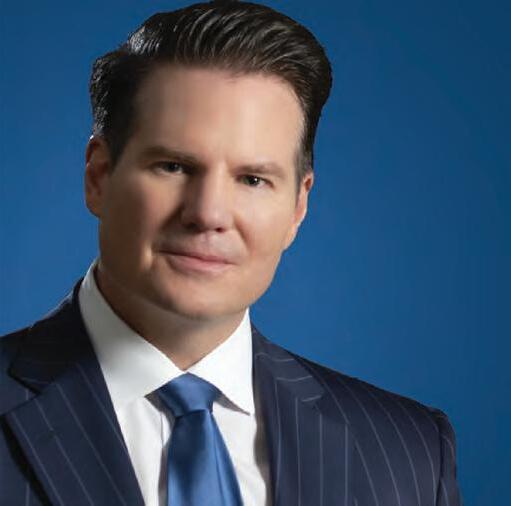






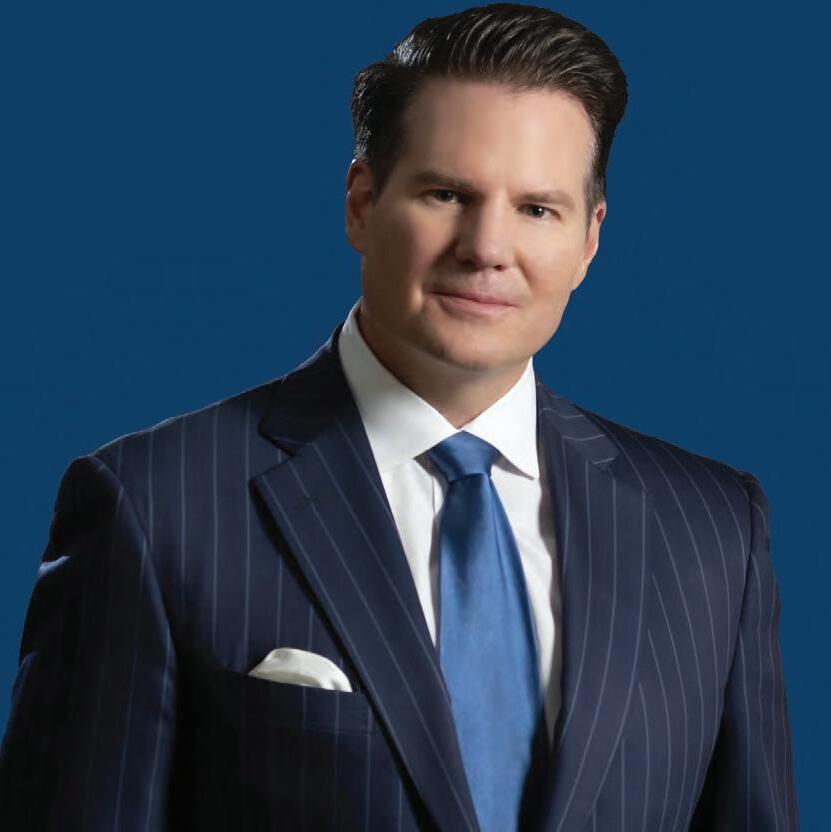

Guest Columnist
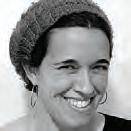
My daughter needed a dress for a special occasion. After extensive market research, we settled on a dress we had seen in a small shop on a nearby kibbutz. The shop was stocked with funky clothes, shoes, and pottery, but unlike the surrounding stores, it had no sign. The shop had no name and no listed hours.
When we arrived at the store at 4:30 p.m. on Tuesday, a slip of paper saying Open was taped to the front door which was firmly bolted shut. A mannequin wearing the exact dress we had come for taunted us from behind the glass. We headed home in defeat.
Two days later we returned. The store was open, and the mannequin was looking super fine in the dress. We asked the saleswoman if she had an identical dress, but she told us to take the one in the window. After a few sweaty and complicated minutes of disrobing the dummy, the dress was in our hands.
A beautiful yet impractical pair of flowery yellow sandals caught my eye.
“How much are these?” I asked.
“219 shekels,” the woman answered. That felt like too much for an impulse buy, so I handed her the dress and my credit card. That’s when she told me that the credit card machine was broken — it was cash only that day at No Name, and I had no cash.
“No problem,” I said, “I’ll come back tomorrow.” But she shook her head, the shop with random hours was not open on Fridays.
“OK, hold it for us, we’ll run home and come back.” I pointed at the mannequin. “Do not give her back that dress!”
We made the 15-minute drive home, grabbed some cash, and returned to the store. I triumphantly handed the bills to the woman, but she shook her head, “These are big bills. I don’t have any change.”
I was done. But my daughter was staring at the dress with the longing look I reserve for the couch every evening starting at 9
p.m. So she ran next door to get change. We bought the dress and left, with only a short backwards glance at the yellow sandals.
I found myself back in the area the following day. I paused in front of the unnamed store to take a picture of the mannequin, with whom I now felt an odd kinship. She was wearing a new dress and
“Mazal Tov.” I found many “Happy Birthday,” “Yay for your Bar Mitzvah,” and “A Princess is Born” balloons, but the “Mazal Tovs” were few and far between. I finally found five, and handed them to the young woman at the helium tank.
Unfortunately, she seemed to be rather inexperienced in the art of balloon infla-
I am thrilled to be part of this unfolding Israeli story where we hustle to get by, manage our fears, and remain steadfastly determined to buy pretty things.
looked even more fabulous than the day before. Surprisingly, the shop was open. I went in to spend a meaningful moment with the impractical sandals, only to find a different woman bustling around inside.
She introduced herself as the owner.
“I didn’t think you’d be open!” I gushed. “I was here yesterday with my daughter — we love everything you have!”
At this point, my Hebrew could not keep up with my brain, and my last sentences were something like, “I steal dress from window person! Why store no name?
Shabbat Shalom.”
I eagerly await the day when science will explain why I can’t speak Hebrew and feel an emotion at the same time. Also why I can’t speak Hebrew while driving. Or while having eyes.
The owner politely ignored the fact that I had ceased to be coherent, and she asked, “You were here yesterday? Do you remember if the credit card machine was working?”
I told her I remembered definitively that it was not working. And I shared with her the remarkable coming-of-age tale of our tenacity and perseverance. She sympathized, and we said our goodbyes.
I proceeded to the paper goods/party supplies/toys/kitchenware/linen store that is ubiquitous to every town in this country. My friend’s son was getting married, and I had the honor of helping to decorate their home for Shabbat.
Once inside, I rifled through the racks of helium balloons looking for ones that said
tion, for she accidentally overfilled the first balloon, and it popped dramatically. Everyone in the store stopped. Mothers reached for their children and soldiers reached for their weapons, only to realize that there was no immediate danger. They let out a collective breath, shook their heads in my direction, and muttered, “Hashem Yishmor” — God Help Us, as they placed their hands over their racing hearts. Israel during war is not the best time to pop balloons without warning.
I turned back to the rack to find a replacement “Mazal Tov.” As I quietly cursed bar mitzvah boys everywhere, the woman from the shop came in looking for me.
“Do you live nearby?” she asked. I told her that I did, and she asked if I would be willing to help her advertise her store in local WhatsApp groups. You know, help drum up business for the store with no name and no set hours. The one that doesn’t take credit cards or make change.
“Of course I’ll help you!” I said excitedly. She asked for my phone number, and the next five minutes transpired like this:
Me: 0-5-8,
Helium balloon: POP!
Patrons: Gasp! Glare! Hashem Yishmor! Me: 6-9-1, – Hey, do you mind looking through this stack for more “Mazal Tovs”?
Store owner: Do you think your friends will come to my store?
Balloon: POP!!
Patrons: Glare! Hashem Yishmor! Me: Wait, that was a 9, not a 5, and
then another 9… Well, you have great stuff, but maybe it would help if you had regular hours…
Balloon: POP!!!
Patrons: Are you freaking kidding me?? Me: Is it weird to bring a princess balloon to a groom?
Store Owner: I sell clothes for princesses! Tell your friends!
Balloon: POP!!!!
Miraculously, the “Mazal Tov” balloons got found and inflated, the store owner wrote down some version of my phone number, and I made it safely outside without inciting the jumpy patrons to violence. As I said goodbye to the shop owner, I decided to try my luck one more time — now that we had bonded, perhaps she would understand the urgency of my need for impractical yellow sandals.
“How much are those sandals?”
“219 shekels”.
“Are you sure?” I asked wistfully. She was quite sure.
“Maybe me come back soon shoes different day please yellow,” I said, wishing I could speak Hebrew while simultaneously feeling wistful.
Luckily, it’s hard to feel anything but joy with a bundle of hard won balloons floating above your head. I may have had practical shoes on my feet, but I already knew I’d be back — to check on the owner, gaze mournfully at the sandals, and get fashion cues from the trendy window person. I am thrilled to be part of this unfolding Israeli story where we hustle to get by, manage our fears, and remain steadfastly determined to buy pretty things. Where we are hopeful and helpful as we navigate locked doors, and where we overcome imperfection to achieve connection and celebrate life.
If you’re in my area, stop by the store that’s just down from the paper goods/party supplies/toys/kitchenware/linen store. Don’t be fooled by the open sign, it’s likely closed. Tell the owner that the incoherent balloon lady sent you — the one with eyes. But don’t expect a discount. PJC
Kally Rubin Kislowicz grew up in Pittsburgh, and made aliyah from Cleveland to Efrat in 2016. This article first appeared on The Times of Israel.
Why weren’t Columbia protesters brought to justice?
By dismissing 31 of the 46 cases against protesters who briefly occupied Columbia University’s Hamilton Hall in April, Manhattan District Attorney Alvin Bragg has done a disservice to the residents of New York City, who deserve a justice system that is willing to pursue cases even when they are difficult — and, dare I say it, may not align with the

ideology of the prosecutor.
The Hamilton Hall protest, a climax of the movement of student encampments protesting Israel’s military actions against Hamas that swept campuses this spring, was intertwined with apparent support for Hamas’ Oct. 7 attack on Israel. If there was a question about the values informing the protest, it was made clear by slogans posted by the perpetrators, including “Political power comes from the barrel of a gun.” Many of the individuals involved covered their faces, and covered surveillance cameras.
A reasonable conclusion to draw is that all of this was designed to instill fear and
create a sense of chaos while avoiding identification.
Bragg specifically cited the protesters’ masks in announcing the mass dismissal of charges; he said they made participants difficult to identify, and thus to prosecute.
To me, that reads as an excuse: Surely the DA’s office must have extensive tools with which to develop and prosecute a case against someone who unlawfully occupied a building.
Wearing a mask is not a particularly sophisticated anti-detection device. In the Old West, gunmen robbing banks wore masks. Billy the Kid wore a mask. If they could prosecute bank robbers then, I’m sure
we can overcome the mask obstacle now. No doubt, it was difficult to prosecute the Jan. 6 insurrectionists, many of whom wore masks, but the United States Department of Justice did just that.
The primary job of a district attorney — their obligation, imposed by the law — is to prosecute violations of the law.
Although a district attorney is permitted to exercise discretion — meaning, they are allowed to employ their own judgment and wisdom in pursuing justice — they are not authorized to pick and choose which laws they enforce. Their political interests
Last week, the Chronicle asked its readers in an electronic poll the following question: “Do you think Joe Biden and Donald Trump should debate again before the election?”
Of the 284 people who responded, 47% said no, 45% said yes, and 8% weren’t sure. Comments were submitted by 93 people. A few follow.
I think they should debate, but only if Donald Trump agrees to fact-checking.
There’s no need for another debate just as there was no need for the first. The majority of people have already decided how they will vote.
I think both of them should drop out of the race. Americans deserve better than either of these candidates.
I only saw small parts of the debate, and it was clear that neither of these men should be running. One is a criminal and a pathological liar. The other did a good job during his first term, but is clearly too old to continue.
Cuomo:
Continued from page 12
cannot supersede the laws of the state. In his defense, Bragg has been up front about picking and choosing what laws he was going to prosecute. Within days of taking office, he even put out a memo outlining some of the charges he wouldn’t pursue.
We can argue whether it was wise for him to say he wouldn’t prosecute fare evasion on subways and buses at a time when the financial health of New York City’s mass transit system is weak, or possession of large quantities of marijuana at a time when illegal cannabis shops have been allowed to operate with virtual impunity.
But the targeting of Jewish New Yorkers after the brutality of Oct. 7 must be taken seriously.
The Hamilton Hall takeover ended when Columbia University, which had been loath to utilize the New York City Police Department, finally called them for assistance. By the end of the night, more than 110 people had been arrested, at least a
quarter of whom appeared to have no affiliation with Columbia.
While it may not be that every case would have led to a conviction, the residents of New York City deserved to have the cases prosecuted, because the failure to
The people should hear/see the candidates instead of having to rely on biased media. If it were not for the first debate, people who rely on outlets that protect the current president would not be aware of his cognitive issues.
Another debate would not serve any purpose and will give Trump another opportunity to spout his nonsense rhetoric.
Biden should not be judged on 90 minutes. Woodrow Wilson’s wife basically ran the country for several years and all went well.
Joe Biden needs to redeem himself — or, better yet, drop out of the race.
They should have another debate, but they won’t because it benefits neither party. Trump is happy with the debate, so why repeat it? Biden can’t risk a second debate going like the first, so he will focus on TV interviews instead.
It was particularly necessary they not do so in this case, because by letting the cases lapse, Bragg’s office has sent the message at this time of increased antisemitic activity that those looking to instill fear in Jews by creating chaos and destruction can do so
Equal justice under the law is not just some slogan. It is the cornerstone principle of the criminal justice system.
do so suggests that the justice system that represents them is far from impartial. As the opening lines to every episode of the TV series “Law & Order” eternally remind us: “In the criminal justice system, the people are represented by two separate yet equally important groups: the police who investigate crime and the district attorneys who prosecute the offenders.” It is necessary that the latter group not fall down on the job.
Praise for Falk House
I would like to commend the Falk family, The Branch, Alison Karabin and Verland for the establishment of the Elliott and Esther Falk House, a community living arrangement.
with reckless abandon. They have given the impression that certain crimes are not worthy of prosecuting and that certain groups are not worthy of protecting. As a serious secondary consequence, Bragg’s decision is likely to further dishearten the majority of New Yorkers who believe that the criminal justice system has been politicized.
If our leaders give people a reason to mistrust our institutions, they will do just
It never ceases to amaze me that the greatest country the world has ever seen can produce such buffoons as these two to potentially lead.
Biden needs another debate (even though the result will likely be similar to the first debate). Trump has nothing to gain by another debate. Our country has much to lose by another debate, when various nefarious world leaders will clearly see yet again how demented and weak our current president is. A very dangerous further revelation of the vulnerability of our country with Biden still in office.
Absolutely! The American people need to see the real situation. PJC
— Compiled by Toby Tabachnick
Chronicle weekly poll question: At what age do you think a child should get their first cellphone? Go to pittsburghjewish chronicle.org to respond. PJC
that. Is there any wonder that so many of our Jewish brothers and sisters are concerned? We all should be concerned. Equal justice under the law is not just some slogan. It is the cornerstone principle of the criminal justice system.
Thankfully, New York law provides for situations in which a district attorney does not fulfill their obligations. Gov. Kathy Hochul has repeatedly spoken about the importance of ensuring all citizens feel safe. She visited Columbia University and expressed sympathy with Jewish students. With the stroke of a pen, she could appoint a special prosecutor to investigate hate crimes and enforce these laws as written. In doing so, she would leave Bragg without the responsibility of continuing to worry about handling these “difficult cases.”
It’s past time to hold those engaged in these egregious acts accountable. PJC
Andrew Cuomo was the 56th governor of the state of New York. This story originally appeared in the Forward. To get the Forward’s free email newsletters delivered to your inbox, go to forward.com/newsletter-signup.
Thank you all for making this happen.
I have known the Falk family for quite some time. Esther Falk was dedicated to Joshua, and I was with her when several meetings occurred with The Branch and Verland. The Jewish religion was always important to Mrs. Falk and Joshua. Unfortunately, the group home that Joshua was in before the creation of Falk House did not provide him with the Jewish fulfillment he needed. The fact that his brother, David, continued to persist and have Joshua live in the home he grew up in is wonderful for Joshua and establishes a legacy for the Falk family.
We invite you to submit letters for publication. Letters must include name, address and daytime phone number; addresses and phone numbers will not be published. Letters may not exceed 500 words and may be edited for length and clarity; they cannot be returned. Send letters to: letters@pittsburghjewishchronicle.org or Pittsburgh Jewish Chronicle, 5915 Beacon St., 5th Floor, Pittsburgh, PA 15217
We regret that owing to the volume of correspondence, we cannot reply to every letter.
Jeff Weinberg Pittsburgh
By Toby Tabachnick | Editor
There are a few reasons why Tony Award-winning actress Idina Menzel chose to call her new tour “Take Me or Leave Me.”
Of course, it’s a tribute to her character Maureen’s signature song in the Broadway musical “Rent,” Menzel’s first professional job, which helped propel the Jewish performer to fame.
But it’s more than that, she told the Chronicle. “This tour is really about me allowing my vulnerability and my willingness to take risks and allow people to really see inside my soul,” she said. “It’s more about, you know, I’m going to put myself out there and I hope that you accept me.”
Menzel, a singer/actress/philanthropist also known for her star turn in Broadway’s “Wicked,” and for voicing the role of Elsa in Disney’s “Frozen” franchise, will bring her show to Pittsburgh’s Benedum Center on Aug. 10 at 8 p.m. She recalled performing here just a couple weeks after the Oct. 27, 2018, antisemitic shooting at the Tree of Life building, which left 11 worshippers from three congregations dead and several other people seriously wounded. She tailored her show then to address the trauma, as she “knew it was on everyone’s mind,” she said. Afterward, Menzel wrote a song about the attack, “A Tree of Life,” which is featured in the HBO documentary “A Tree of Life: The


Pittsburgh Synagogue Shooting.” The song is about resilience and coexistence.
Menzel, who said she feels “a real connection to Pittsburgh,” is nothing if not authentic. In a 2015 performance at the Benedum, she enthusiastically engaged with her audience, coming off the stage to join in duets with four different fans for a rendition of “Take Me or Leave Me.”
She was so comfortable with her audience that she not only removed her gold high-heel shoes about halfway through the show, but even peeled off her false eyelashes because they were irritating her eyes. She passed them off to an eager fan who ran up to the stage with her hand out.
“I’ve always worn my heart on my sleeve, to be honest, and I’m going to continue to do so on this tour,” Menzel said. “I sing music that chronicles the timeline of my life and my career and my experiences, and I talk about how those songs have informed who I am and what those experiences were like at the time, and what I learned from them.
“I’m also very in the moment,” she added. “So I think, for better or worse, I have a willingness for staying open and allowing for whatever’s
on my mind to come out — in front of thousands of people — but I’ve always believed that the performances that have moved me in my life, by the artists that inspire me, are the ones that the people were willing to be open and authentic. That’s really the only way that you really can touch someone in your audience.”
Menzel’s recording career includes multiple cast albums and solo albums. This past fall, she released her dance project “Drama Queen” via BMG, showcasing her vocals through disco-infused beats and soaring anthems. She’s released two children’s picture books with her sister, Cara Mentzel, called “Loud Mouse” and “Proud Mouse,” via Disney Publishing Worldwide. Both books center around self-acceptance and being true to yourself.
The “Take Me or Leave Me” tour will include “a wide spectrum of music calling on many genres,” Menzel said, “because that’s my life, that’s my career. You know, I was a wedding singer when I was a teenager, into my college years, and I had to sing all kinds of music, everything from pop, rock, Motown, jazz. So it’s just sort of in me that I like to explore all styles. And then, because I’ve been in so many mediums, whether it be in theater or TV, film or just doing my concerts as myself, I have all different kinds of music that are associated with me. That’s kind of what I’ve learned to really embrace and have fun with.”
Some of her original songs will be included as well.
“I have the most devoted, supportive fans,” Menzel said. “They’re very sophisticated, and


they’ve welcomed my creative choices for all these years. They’ve allowed me to explore different avenues and always go along with me. There have been some of my albums that sometimes I don’t do anything from, and then they complain to me that I haven’t revisited that music, so I’m actually making a point of going back into some of my old albums and making sure that I include them.”
Also included in the concert will be two songs from her new musical “Redwood” that’s coming to Broadway early next year, she said.
“I’m excited to introduce people to that story and that music and that character,” Menzel said.
The show, which she created with her friend, director Tina Landau — who is writing the book and the lyrics — has been her “passion project for over a decade.”
“It’s about a woman who is going through a turning point in her life, and she gets in her car in New York City and decides to just escape, and starts driving across the country, and doesn’t stop until she gets to the foot of the mystical, majestic redwoods,” Menzel said. “It’s something that I don’t think anyone’s seen before, and I really think people will relate to it.”
She clearly wants her fans to be happy — and to feel at home.
“No matter how big the venue,” Menzel said, “I like everyone to feel like they’re in my living room. That’s really important to me.” PJC
Toby Tabachnick can be reached at ttabachnick@pittsburghjewishchronicle.org.






















































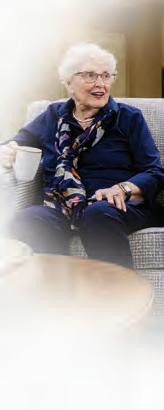
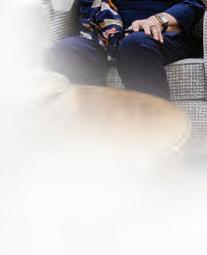







By Jessica Grann | Special to the Chronicle
My youngest son just had his 16th birthday and requested his favorite: an Oreo ice cream cake from the ice cream store. Unfortunately, the store recently closed — and it was the only one in the city certified kosher. I felt a bit daunted at the thought of experimenting with something new for such a special day, but I realized that it couldn’t be that difficult.
I’m happy to say that if you have basic cake-making skills, you can easily make this at home.
I made homemade whipped cream for frosting, but I used a cake mix and bought both the cookies and the ice cream — and this was one of the best birthday cakes I’ve ever made.
My husband asked if I could make him a strawberry version with yellow cake for his upcoming birthday, so I think that I’ll be making a lot of these in the future. Once you get the basics down, you could make this with any combination of ice cream and cake.
I iced this simply and decorated it with a few whole cookies. If you have the skills to pipe the whipped cream to make the top more decorative, then you can go all out. You can also drizzle chocolate Magic Shell topping onto the finished product before freezing it again to harden the chocolate.
Ingredients (Serves 12)
1 box of devil’s food cake mix, prepared in 2 9-inch pans according to instructions on the package

1½ gallons of cookies and cream ice cream (see note)
1 package of Oreo cookies
For the whipped cream topping:
1 pint (2 cups) of heavy whipping cream
2-4 tablespoons of powdered sugar
Bake the cake in 2 9-inch round cake pans according to the instructions on the box and let the layers cool completely before assembling. If your cake layers have a domed top after baking, take a large knife and gently slice off the rounded tops once cool.
Be sure to buy real ice cream. Unfortunately, a lot of what we assume is ice cream is now labeled as “dairy dessert.” Dairy dessert has a different composition and does not harden when frozen.
Set the ice cream container on the counter for 15-20 minutes until it’s soft enough to scoop. If the texture seems soupy, pop it back into the freezer to get it firmer. The ice cream must be soft enough to spread but not so soft that it starts running all over the place.
I used a springform pan to protect the cake in the freezer. I didn’t close the spring, so I don’t think you’ll have issues if you don’t have one of these pans.
Cut a piece of wax paper to size and place the first layer of cake on top.
Use an ice cream scoop to scoop out about ⅓ of the ice cream onto the bottom layer, making sure that the scoops are uniform in size and set close together so that there are not any empty spaces between the ice cream scoops. Use a metal icing spatula to smooth the top of the ice cream layer.
I added an extra layer of cookie crumbles for texture: Take about 12 cookies and put them in a large plastic bag. Crush them well with a rolling pin, then sprinkle them over
the first layer of ice cream. Work quickly to avoid the ice cream getting too soft. If the ice cream seems to be melting, stop your work and pop everything back into the freezer for a bit.
Add ⅓ more of the ice cream for the second layer, repeating the scooping technique you used with the first layer before placing the second layer of cake on top.
Reserve the last bit of ice cream to smooth out the sides between layers, then pop the remaining ice cream back into the freezer until the next step. Don’t worry about making the ice cream flush with the outside layer of cake at this point because you have enough left over to fix that later.
As soon as you place the top layer of cake, put it immediately into the freezer for about 2 hours. If using a springform pan, set it around the cake as added protection.
When you’re ready to fill in the sides of the layers with ice cream, take the rest of the ice cream out to soften a bit, then take the cake from the freezer and fill in the edges between the layers so that the sides are smooth and ready for the whipped cream icing.
Freeze the cake for another hour before adding the whipped cream layer. If you want to add the whipped cream layer the following day, gently cover it in plastic wrap so that the flavor is not affected by your freezer.
Homemade whipped cream is easy to make and holds up well in the freezer. It helps if you can place your mixing bowl and beaters into the freezer for about 15 minutes before whipping the cream, especially if it’s hot in the house.
Add the heavy whipping cream to the cold bowl, and use an electric mixer on the medium-low setting for 1-2 minutes before adding in the powdered sugar, one tablespoon at a time, until you reach your
desired sweetness. I use 2-3 tablespoons of powdered sugar because the cake and ice cream are sweet as they are.
After adding the sugar, turn the speed to medium-high and whip until stiff and spreadable, which usually takes 3-5 minutes. This recipe makes just enough whipped cream to frost the top and sides of this cake.
Take the cake from the freezer just before frosting. Scoop about half of the whipped cream onto the top of the cake and spread it with a long icing spatula until the top is smooth and covered, then add the rest to the sides, rotating the cake to the left as you spread the whipped cream to the right, smoothing it out as well as you can.
Decorate the top as desired with cookies and freeze it uncovered for another hour. The whipped cream will be solid enough so you can cover the cake gently with plastic wrap until it’s time to serve.
You can make this cake days in advance. I can’t wait to get creative and see what other flavors I come up with now that I know that I can easily make these cakes at home. Ice cream cake is a delicious dessert any time of year and certainly not just for birthdays.
Enjoy and bless your hands!
Note about the ice cream: It’s hard to find a true half-gallon thanks to shrinkflation. The package looks about the same but it contains less ice cream. To be safe, buy 2 packages of ice cream. Use half a package for each ice cream layer, and use the second package to fill in the sides. You’ll have at least half of the second container left for future use. PJC
Jessica Grann is a home chef living in Pittsburgh.
By Adam Reinherz | Senior Staff Writer
Jewish comedian Natan Badalov doesn’t like matzah ball soup — no joke.
The Uzbek-American comic, who also detests gefilte fish, quipped that he took an Ashkenazi friend out for Bukharian cuisine. The two ate plov and dimlama. Badalov’s friend asked, “What is this?” Badalov replied, “Food.”
The joke kills on stage. Its subtext is more painful.
Among the swaths of Bukharian immi grants fleeing the former Soviet Union, Badalov’s family came to the United States in the early 1990s. Between second and eighth grade he attended Park East Day School on the Upper East Side of Manhattan.
Immersion in the Jewish day school presumably should have integrated Badalov among his peers, but he remained an outsider.
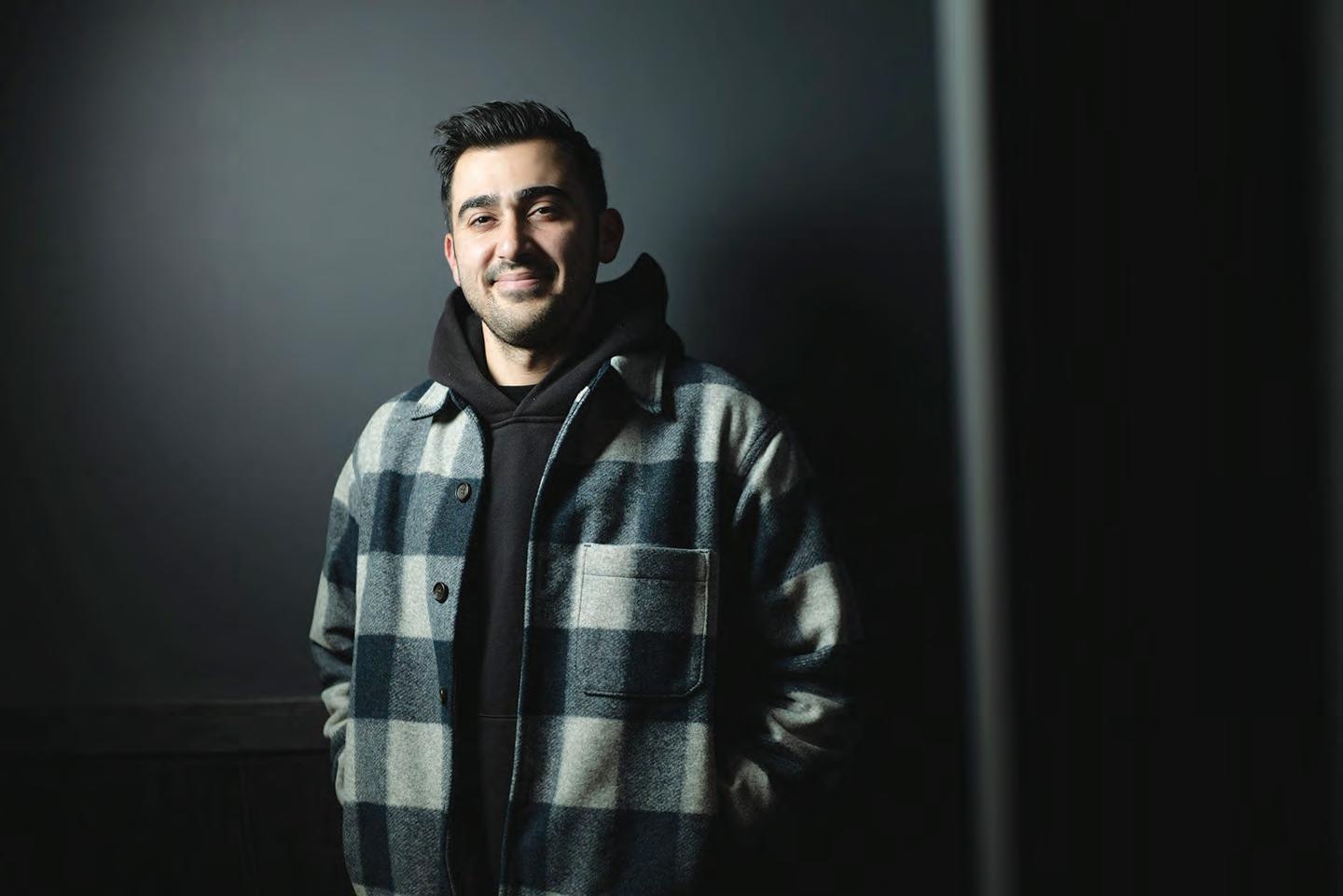
“There were divisions culturally,” Badalov told the Chronicle by phone from Queens, New York. Being Bukharian among an Ashkenazi majority “added to tensions in my life.”
Badalov donned a yarmulke, tefillin and had a bar mitzvah, but he was still often dismissed by others.
“When I was a kid, we weren’t even




rabbi didn’t last, but the jesting did.
About eight years ago, he started working on serious material. He mined his past and discovered its comedic richness. Badalov made an animated web series, “Park West,” about his time in day school. He took to the stage to speak about being Bukharian.
Data is hard to come by, but My Jewish Learning suggests there are about 75,000




“When, by contrast, a person has totally sublimated his identity to the mission with which G-d has entrusted him, he does not need to remind himself of the need to be humble; self-concern is of no importance to him.”




Lee & Lisa Oleinick


Bukharian Jews in the U.S. Conversely, 1.4 million people in the Greater New York area identify as Jewish, according to the
Badalov’s bits became a set. “Connect the Dots,” which the comedian will treat Pittsburghers to on July 27, is a nearly 55minute show about maturing in New York.
“A lot of it has to do with me navigating my cultural identity as a Bukharian Jew, and also what that led to in my life,” he said.
“ There’s only about 200,000 Bukharian Jews in the world,” he continued. “I think this is one way to kind of see a different light, or a different side, to Judaism.”
Several clips are posted on Badalov’s Instagram account. The anecdotes are humorous but fail to tell the comedian’s story.
“You can’t get anyone’s narrative or perspective in a 30-second clip. I think humans are too nuanced and too multidimensional,” he said. “You have to actually see them to see where they’re coming from.”
S canning Badalov’s social media might make someone think he’s simply spouting mordant memories, but there’s more to the tale.
The show isn’t “American Jews suck, matzah ball soup sucks, all this other stuff. Rather, this is what happened to me and this is what it led to and these are the conclusions that I came to with my life experience,” he said. “In the end of it all, the show basically has to do with me kind of overcoming my resentment.”
“Connect the Dots” is a purposefully
it,’” Badalov said. “Especially in standup, authenticity is such a highly sought-after, highly valued, aspect of performance. So if you’re not authentic, I think the audience can obviously tell that.”
Badalov has never been to Pittsburgh. He picked the city because it’s one of several across the U.S. that has a “decent concentration of Jewish people,” he said. “I want to take it to where people would understand it and kind of connect with it a bit more.”
Steve Hofstetter, a comedian and owner of Sunken Bus Studios, where Badalov will perform, told the Chronicle, “There aren’t a ton of Jewish comedians in Pittsburgh, and we’re thrilled to be importing a great one.”
Badalov appreciates the praise and kind reviews of his material. He hopes Pittsburghers attend the performance but cautioned against seeing “Connect the Dots” as anything too profound.
“I don’t want to oversell it,” he said. “Because it is just a comedy show, but it is a Jewish comedy show. It’s just my perspective, I guess.”
Natan Badalov: Connect The Dots is at Sunken Bus Studios, 3312 Babcock Blvd., on July 27 at 7:30 p.m. Tickets are available at sunkenbus.com. PJC
Adam Reinherz can be reached at areinherz@pittsburghjewishchronicle.org.











Aaron and Emily Weiss are proud to announce the birth of their daughter Lydia Betsy Weiss on May 13, 2024. Lydia was born at 7 pounds, 14 ounces. Big brother Carson and grandparents Jeffery and Randi Weiss, and Timothy and Angela Bittle are all excited for this new addition to the family. Lydia’s middle name is in honor of Aaron’s late grandmother Besty “Wawa” Evans.

James and Maria Bluestone joyfully announce the marriage of their daughter Dane to Joseph Holland. Dane is the granddaughter of Patricia Bluestone and the late Dr. Charles Bluestone and the late Virginia and Jack Bonasso. Joe is the son of Melissa and Gregory Holland, and the grandson of Sandra and the late Charles Boburka and the late Norarita and Frank Holland. The wedding took place on Isla Mujeres, Mexico, in June. Dane and Joe reside in Delaware. PJC
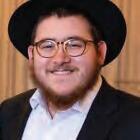
On Tuesday, thousands worldwide marked the 30th yahrzeit of the Rebbe — Rabbi Menachem M. Schneerson, of righteous memory, the most influential rabbi in modern history. Here in Pittsburgh, communities have been commemorating the Rebbe’s yahrzeit with gatherings to celebrate his life, reflecting on and rededicating ourselves to his teachings and ideals.
On Sunday, a bus traveled from Pittsburgh to the Rebbe’s resting place in New York, the Ohel, where the delegation joined thousands of visitors who prayed there this week.
In this week’s Torah portion, Chukat, we read of the passing of two tzadikim (righteous individuals): Moses’ brother Aaron the high priest, and his sister Miriam, the prophetess.
The Midrash tells us that, in the desert, the Jews were blessed with three miraculous




listen and find out more, go to janicecoppola.com
contact Janice at janicecoppolatimes10@gmail.com

call (412)735-5973


equally, he begot the unifying clouds of glory. Miriam, the Talmud tells us, was also known as Puah. She dedicated herself to raising the next generation of Jews who were to leave Egypt and receive the Torah. Torah is likened to water.
Just as water descends from the greatest heights to the lowest valley, so does Torah come from its place of glory to this lowly physical world. Therefore the well of water was in her merit.
Back to this week’s Torah portion: When Aaron and Miriam passed away, the clouds of glory and well both disappeared — only to return in Moses’ merit.
In a talk the Rebbe gave in the early years of his leadership, he deduced that Moses pivoted. While his forte was shepherding the Jews, symbolized by the manna, he adopted a new function, thus bringing back the clouds and the well. This is the true symbol of a Jewish shepherd. He busies himself not only with his natural role. When necessary, he pivots for the Jewish people. While Moses’ role was to
As we mark the Rebbe’s 30th yahrzeit, we can reflect on his truism: Each and every one of us must pitch in to help the Jewish people.
resources in the merit of these three righteous people: The manna, the bread that descended daily from heaven and tasted like whatever the eater was in the mood for, was in Moses’ merit; the clouds of glory, which shielded the Jews from enemies, killed dangerous snakes in their path, smoothed the mountainous terrain and cleaned their clothes, was in Aaron’s merit; and the traveling well, which provided water for all their needs, was in Miriam’s merit.
What is the connection between these resources and the tzadikim in whose merit they existed?
Moses’ early occupation was as a shepherd.
instruct the leaders under him in guiding the Jewish nation, he adopted the roles of his late brother and sister as well.
The Rebbe continued that each Jew has a spark of Moses within themself. Thus, this story in the Torah serves as a lesson for each and every Jew. While we all have “our thing” — what we like doing, what we’re good at — we must learn from Moses that when there is a danger to our fellow Jews, we must pivot and adapt, ensuring their safety.











The Midrash tells us that upon seeing Moses tend his flock in an individualized fashion, having the young sheep graze on the soft grass, and then the older ones on the tougher grass, G-d chose Moses to be the shepherd of his flock — the Jewish people.
For this reason, the manna was in his merit, for Moses’ job as the leader of the Jewish nation was taking care of every person and their varying needs. The Talmud tells us that G-d distributed the manna in different forms, depending on the consumer’s level of righteousness. Thus, the personalization of the manna fits with Moses’ post.
The Mishnah also tells us that Moses’ older brother, Aaron, was a lover of peace and pursuer of peace; a lover of the creatures who brought them close to Torah. Therefore, the Torah writes that after his passing, the entire Jewish people wept in mourning for 30 days. They all appreciated him, and his tremendous universal love evoked in them a thirst for mitzvah observance.
This is why the clouds of glory were in Aaron’s merit. This protective shield encompassed all Jews, regardless of their merit — even idol-bearers. Since Aaron loved all
The Rebbe elaborated further that although one may have no personal concern for the snakes and scorpions — as the Talmud states that an animal only harms one who lacks a G-dly image — if another Jew is in danger, they must be saved. This is a life-and-death situation, and when Aaron and Miriam were no longer taking care of this, Moses needed to step in to fill their roles, providing not only manna, but protective clouds and water as well. Moses’ remarkable transformation teaches us that when someone else needs it, we must do what it takes to make it our thing.
As we mark the Rebbe’s 30th yahrzeit, we can reflect on his truism: Each and every one of us must pitch in to help the Jewish people. We all have someone, or two, or 10, in our circle of influence who needs us. We have to be there for them, even if it’s not our thing.
And as the Rebbe told a businessman: “To influence all the Jewish people is a big task, but nevertheless, every Jew has the power to do so, because he is going with the help and blessing of G-d Alm-ghty Himself.” PJC
Rabbi Yossi Feller is the rabbi of the Chabad Jewish Center of Cranberry. This column is a service of the Vaad Harabonim of Western Pennsylvania.
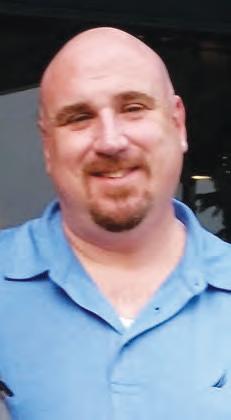
CALIG: Gregory Calig, age 52, passed away on Sunday, July 7, 2024, after a long illness. He was the son of Claire Calig and the late Joseph Calig. Grandson of the late Helen and Harry M. Kamin. He is survived by his children, Harrison, Ross, Dylan and Alana Calig, and his brother and sister-in-law Daniel and Erin Calig. Greg graduated from Indiana University and Duquesne University before working in the real estate and insurance industries. He loved spending time with his children and dogs and cats. He especially enjoyed going to Steelers games with his children and cheering for the Pirates and Penguins, watching any and all sports on television, fishing with his sons and traveling to both new and familiar places. Graveside services and interment were held at Tree of Life Cemetery-Sharpsburg. Contributions may be made to Adat Shalom Congregation, 368 Guys Run Road, Cheswick, PA 15024. Arrangements schugar.com
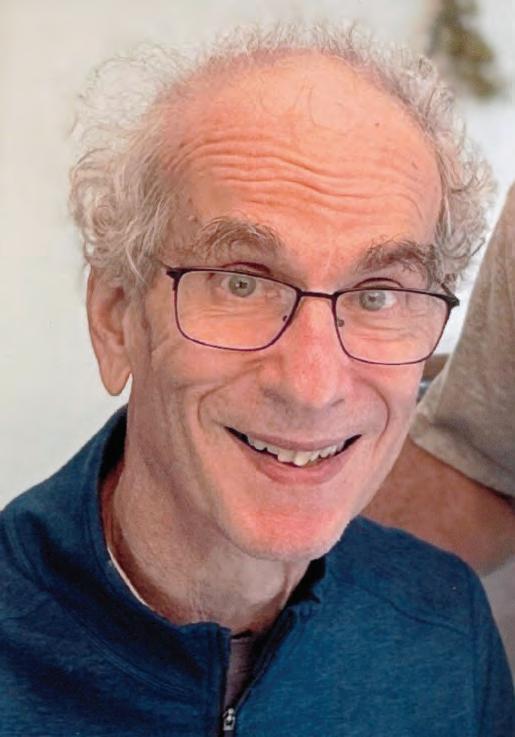

HODES: Robert Leon “Bob” Hodes, 73, of Pittsburgh, died on July 2, 2024. He was preceded in death by his parents, Sylvia and Morton Hodes. Bob is survived by his loving wife of 45 years, Denise Z. Hodes; his children, Hilary Hodes (Mike Kalafatis) and Matthew Hodes (Carly); his grandchildren, Reese, Lucy and Jordan; and his sister, Donna Appleton (John). Bob was born in Carbondale, Pennsylvania, and attended Scranton Prep High School, University of Pennsylvania and Pennsylvania College of Optometry. Bob was the founder of Eye Care Center West, Robinson Township, where he practiced for over 40 years as an optometrist. He was a proud Rotarian of the Crafton-Ingram Rotary, and an active member of Beth El Congregation of the South Hills. A graveside service was held at Chesed Memorial Park at Richmond Beth-El Cemetery at Forest Lawn, 4000 Pilots Lane, Richmond, VA, 23222. In lieu of flowers, the family asks for memorial contributions to be made in Bob’s memory to Beth El Congregation of the South Hills, Pittsburgh, PA, or to The Rotary Foundation.
KLEIN: Jay Klein, 83, formerly of Center Township, passed away on July 1, 2024. Born on May 10, 1941, Jay was the son of the late Ann and Louis Klein. Jay leaves behind his son, Louis (Nicole) Klein of Pittsburgh. Jay was also the beloved Ampy to his two grandchildren, Addison and Austin, as well as his grandpuppy and favorite napping companion, Brody. Jay also leaves behind his niece, Kimberly Zytnick, Aspinwall, wife of the late Jay Zytnick, and three grandnephews, Zachary, William and Matthew Zytnick. Jay was preceded in death by his beloved wife of 42 years, Ilene Klein, in June of 2023. Jay was a graduate of Aliquippa High School, as well as a graduate of Youngstown State University. Jay took tremendous joy in playing cards with Addison and Austin. Most notably, their games in War over who would be the latest champion — with the winner being the proud holder of the War championship crown that Austin made — often led to both laughter and tears. Jay was highly entertained by the Taylor Swift playing cards that Addison gifted him this most recent Father’s Day, such that they would have a new set of cards for their games. Jay also served as president of the Center Band Parents during Lou’s time in high school, as well as on the board of Beth Samuel Jewish Center in Ambridge during the 1990s. In addition to his devotion to his family, Jay was an enormous sports fan, most notably with an incredible passion for Aliquippa sports. He was particularly thrilled for their numerous championships over the years, including their state championships in both football and basketball within the past year. Jay could often be found talking about the latest sports news and games with his family and friends. Family and friends were received at Huntsman Funeral Home, 2345 Mill St., Aliquippa,
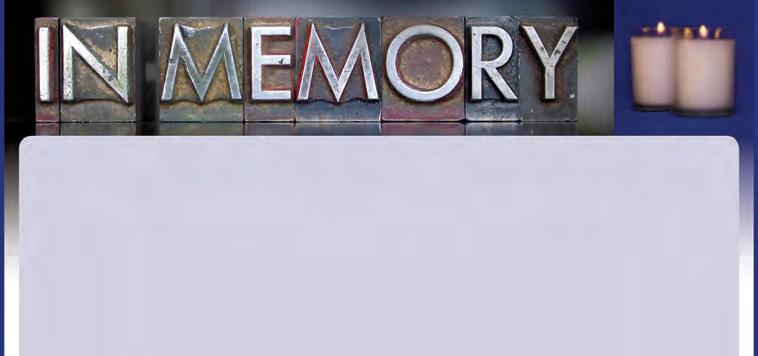
Contact the Development department at 412-586-2690 or development@jaapgh.org for more information. THIS WEEK’S YAHRZEITS —
Sunday July 14: Samuel H Adler, Jesse Carl Devon, Jeanne Eisenberg, Millie Escovitz, Harry “Alter” Goisner, Marion Bergad Halfond, Curtis I Kossman, Fannie Kisilinsky Lindner, A L Mars, Sidney L Patz, Harry Santman, Ruth Marks Schenk, Belle G Schiff
Monday July 15: Sylvia Americus, Herman Margolis Buck, Ray S Freeman, Morris Glasser, Isadore Goldblum, Madeline A Harris, Joseph Herskovitz, Helen Hoffman, Bertha Jacobs, Fred Kaminsky, Irving Kart, Harry Kurtz, Leah Labovitz, Sarah Linder, Helen Marcosky, Julia L Miller, Rabbi Morris Moskowitz, Elizabeth Sack, Frances G Stewart
Tuesday July 16: Helen K Davidson, Isaac Glickman, Marcella Cohen Goldberg, Edward W Harris, Morris L & Mary Ruth Jacob, Edith Liberman, Abe E Rosenfield, Lawrence Rudick, Jerome J Schwartz
Wednesday July 17: Miriam Bachrach, Mollie Harris Beck, Martin Bergad, Major Donald Broida, Anna R Fried, Sam Ginsburg, Meier Katzman, Emil Lebovitz, Mel Leff, Jacob Lerner, Sarah Litman, Charles J Loevner, Meyer Melnick, Rose Moritz, Jacob Rosenberg, Irving Siegel, Bessie Sigler, Josephine Silberman, Gertrude Stalinsky, Michael Joseph Wagner, Nathaniel I Walken
Thursday July 18: Lawrence Brodell, Edythe G Canter, Maurice L Caplan, Benno Dreifuss, Pearl Evelovitz, Fannie Greenstein, Norman Halpern, Rose Janavitz, Saul Lundy, Verna Goldstein Plung, Beatrice Pollock, David Schwartz, Gussie Golda Snyder, Jacob Stern, Gus Whitman, Henry Wolk
Friday July 19: Mildred Caplan, Molvin Glantz, Harry A Jaskol, Leah Lieberman, Morris M Markowitz, Bessie Miller, Rose C Myers, Minnie Shapiro, Paul Sigesmund, Cyril Simon, Bernard Stern
Saturday July 20: Jennie Baker, Ben Foster, Saul J Glick, Regina Goldberg, Rebecca Kaiserman, David Kaplan, Sarah Leebove, Henry Maengen, Louis Perr, Louis Roth, Harry P Schutte, Elmer M Sigman




























PA 15001, with a celebration of life following thereafter. Interment at Beth Shalom Cemetery. In lieu of flowers, the family requests that donations be made to the Ilene Klein Children’s Fund at B.F. Jones Memorial Library, Aliquippa, PA. Donations to the fund can be made online at clover.com/pay-widgets/bcdd587a-f9cf-408e-8611b2861a201582
KRAKOFF: Florence Gottlieb Krakoff, 92, of Ohioville, formerly of Midland, passed away on June 28, 2024, after complications of a recent stroke. Born on Oct. 28, 1931, in Pittsburgh, she was the daughter of the late Abraham and Ada Wolff Gottlieb, and had worked as a secretary at Western Beaver High School for over 20 years. Florence was the former president of the Women’s Auxiliary at Heritage Valley Beaver, as well as a member of the Board of Director’s for H.A.P. Inc for over 30 years. Along with her parents, Florence is preceded in death by her husband, Samuel Krakoff (1990); her son Daniel Krakoff (2012); her brother, Frank Gottlieb (2017); and her stepmother Nettie Bondy Gottlieb (1983). Florence will be sadly missed by her sons, David Wollam, of Fox Chapel, and Rick (Naomi) Krakoff, of Tokyo, Japan; her daughter, Lisa (Rick) Biancucci, of Ohioville; her brother, Dr. Marcus (Carole) Gottlieb, of Pittsburgh; her grandchildren, Adam (Courtney) Biancucci, Bob (Tascha) Biancucci, Seth Wollam (Alex), Joe Wollum, Marigold Gallo (Vince), Abigail Wollam and Matthew Krakoff; seven great-grandchildren; and one great-great

grandson. A graveside service was held at B’nai Emunoh Cemetery, Hampton, PA. In lieu of flowers, memorial contributions may be made to H.A.P., 1198 Mulberry St., Beaver, PA, 15009.
SINSHEIMER: Ruth Nevin Sinsheimer, on Wednesday, July 3, 2024. Beloved wife of the late Joseph Eugene Sinsheimer. Loving mother of Robert Nevin Sinsheimer (late Gretchen Guelde), the late Janet Suzanne Sinsheimer (surviving spouse Alan Izumi), and Ann Sinsheimer (Marvin Sirbu). Preceded in death by three siblings. Grandmother of Andrew Sinsheimer (Jessica Marcrum), Greta (Marquis) Barnes, Rebecca (Chris) Ray and Patrick Weeks. Great-grandmother of Miles, Carson and Harrison Barnes, and Leo, Savannah, Jaxon and Ethan Ray. Step-great-grandmother of Brooklyn Campisi and Skylar Dugan. Ruth was born in Michigan in 1926. She attended the University of Michigan (class of 1948) where she studied pharmacy. She was one of few women in her class. She went on to have a long career as a pharmacist, working first for a state forensic laboratory, then owning a retail pharmacy in Detroit, before finally entering hospital pharmacy. She retired in 1992 after supervising a hospital pharmacy in Ann Arbor, Michigan, for many years. She met her husband in pharmacy school and married in 1954. She loved hockey, travel, old movies, opera and classical music. She was a pianist, briefly playing professionally. She moved to Pittsburgh in 2008, where she learned to be a Pittsburgh Penguins fan. Services were held at Ralph Schugar Chapel, Inc. Interment was private. Contributions may be made to the Pittsburgh Symphony Orchestra, 600 Penn Ave., Pittsburgh, PA 15222 or Rogel Cancer Center, University of Michigan Health, 1500 E. Medical Center Drive, Ann Arbor, MI 48109. schugar.com PJC




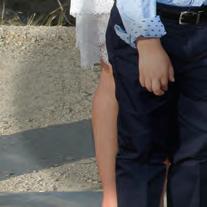
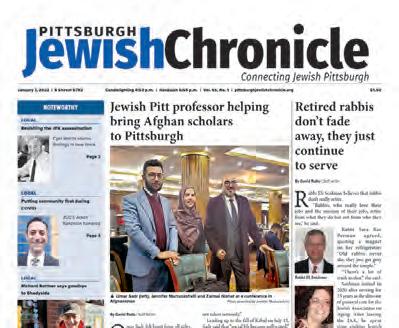

Jewish National Fund Charitable Gift Annuities provide a lifetime of fixed income and a variety of tax-saving advantages. For as little as $5,000, you can help achieve your financial goals and those of a nation—Israel.
Use your IRA Rollover to fund a Charitable Gift Annuity and earn income for life!
* Two-life rates will vary. These rates are subject to change and may not be available in all states.


SERVICES

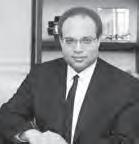


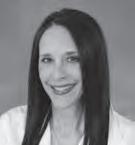


Smith-Rosenthal Team
Jason A. Smith & Caryn Rosenthal
Jason: 412-969-2930 | Caryn: 412-389-1695 Jasonasmith@howardhanna.com Carynrosenthal@howardhanna.com

Baum Blvd. Pittsburgh PA 15232 Shadyside Office | 412-361-4000

Contact me today to discuss all of your real estate needs!
Sherri Mayer, Realtor Squirrel Hill Office C: 412-760-0412 O: 412-421-9121x225 sherrimayer@howardhanna.com HowardHanna.com
5125 Fifth Ave. 2 & 3 Bedrooms Corner of Fifth and Wilkins Spacious 1500-2250 square feet ”Finest in Shadyside” 412-661-4456 FOR RENT
412-661-4456 www.kaminrealty.kamin.com

THE BEST OF THE
THE BEST OF THE IN YOUR EMAIL INBOX ONCE A WEEK.



ONCE A WEEK.
THE BEST OF THE IN YOUR EMAIL INBOX ONCE A WEEK.
Sign up on the right hand side of our homepage. pittsburghjewishchronicle.org
Sign up on the right hand side of our homepage.
Sign up on the right hand side of our homepage.




pittsburghjewishchronicle.org
Sign up on the right hand side of our homepage. pittsburghjewishchronicle.org
pittsburghjewishchronicle.org

Jewish man who discovers in middle age that he’s not, in fact, Jewish, and embarks on a remarkable road trip to come to grips with his fate; it’s Chaim Potok’s ‘The Chosen’ meets ‘Planes, Trains and Automobiles.’”
Your hosts
Toby Tabachnick, editor of the Chronicle
David Rullo, Chronicle staff writer
How it works
We will meet on Zoom on Sunday, July 14, at 1 p.m.
“Goyhood.” It is available at area Barnes & Noble stores and from online retailers, including Amazon. There is also limited availability through the Carnegie
: Contact us at drullo@pittsburghjewishchronicle.org, and write “Chronicle Book Club” in the subject line. We will send you a Zoom link for the discussion meeting.
PJC — Toby Tabachnick





THURSDAY, AUGUST 8, 2024
5:30–8:00 PM
RODEF SHALOM CONGREGATION 4905 Fifth Ave., Pittsburgh, PA 15213


Join the Lev Society for dinner with guest speaker Yona Bartal, former Deputy Director of the Israeli President’s Office and lifelong friend of Shimon Peres. Attendees will receive a copy of Yona’s book as well as the opportunity to have it signed and take pictures with her. Yona will also give an exclusive presentation on her memoir that provides a glimpse into the most well-kept secrets in global diplomacy.
Lev Society Chairs: Sandy and Larry Rosen
COUVERT: $36
Cocktails, Dinner & Dessert (Dietary Laws Observed) Business Casual Attire • On-site Parking
REGISTER BY AUGUST 2, 2024 AT: jewishpgh.org/occasion/lev-society
For questions contact Jenn White at 412-992-5222 or jwhite@jfedpgh.org

Politicians and community members gathered on the corner of Darlington Road and Murray Avenue in Squirrel Hill to demand the release of an estimated 120 hostages still held in Gaza. The
Sound of Jewish Music
Women from across the Jewish community celebrated Jewish music and art on June 9.




Celebrating Cyril
A June 30 memorial celebrated the life of Dr. Cyril Wecht. Held at Temple Sinai, the event was attended by family, friends and admirers of the late pathologist, author and Zionist.



You’re invited to this special concert by the Israeli-touring band, Shufuni
Thursday, August 1 · 7-9 pm
Temple
The concert will be a unique and moving experience as Shufuni's four traveling band members express through music and stories how the events of October 7, 2023 and the days following altered their lives and in many ways, their identities. Shufuni lost band members as well as their audience who were murdered during the horri c attack by Hamas.
The concert and opportunity for Q&A with the band is recommended for ages 16+. Backpacks are not allowed into the facility. Performance is free of charge but registration is required.
This rst-of-a-kind tour through North America, open to everyone, is in partnership with Moving to Our Center (MTOC), and the JCC Association of North America (JCCA).

